ITEM LIST:
HERBERT D. MILES COLLECTION -
Scrapbook of
Herbert D. Miles, 1933 |
|
Box |
Folder |
Item I.D. # |
Description
|
Thumbnail |
Virtual
Coll. |
None |
mile_cover |
Scrapbook cover. Inscribed with "Herbert De La Haye Miles Asheville
1933" |
 |
| |
|
mile001 |
Handwritten inscription: "Herbert D. Miles. Breezemont,
Albemarle Park, Asheville, North Carolina 1933." |
 |
|
|
mile002 |
Blank page. |
|
|
|
mile003 |
Handwritten inscription: "Herbert D. Miles - 'Autobiographical'
Scrap Book" |
 |
|
|
mile004 |
Photograph of Herbert D. Miles[?] 1940. |

 |
|
|
mile005 |
Page 1 of Autobiographical Essay. Reads:
"Autobiographical:
Herbert De La Haye Miles was born in Milwaukee,
Wisconsin, on December 13, 1866, in the fine old house still existing
(1933) at the corner of Martin and Marshall streets, built by his
parents, Frederick Billing Miles, and Ella Victoria Smith Miles.
Next door on Marshall street dwelt his mother's sister, Mrs. Benjamin K.
Miller, wife of a distinguished lawyer.
His mother was born and spent her youth in Saint John,
New Brunswick, Canada. Her parents were leaders in their
community, her father the head of the wholesale drug house of W. O.
Smith and Company and many times Mayor of the City, and grandson of
Nathan Smith, a surgeon in the British Army, who established the
business in colonial times, about 1790. It is through her mother,
Eliza Chipman, that Herbert Miles comes into his line of the Mayflower
Descendants. Her grandmother was Sally Miles of Cornwallis, Nova
Scotia, and Sunbury, N. B.
His father's mother was born Eliza Delahoy, of London,
England. Her family, French Hugenots [sic], had settled in England
after the Massacre of Saint Bartholomew 300 years previously,
|
 |
|
|
mile006 |
Page 2 of Autobiographical Essay. Reads:
"Brief Outline of Mayflower Ancestry:
John Howland - John Chipman - To H. D. M.
Elizabeth Chipman (born Cornwallis, Nova Scotia, 1809) is Grandmother
of H. D. M., and is great grandaughter [sic] of Handley Chipman, the
founder of our line in Nova Scotia.
Handley's father, the second John Chipman, (born in Barnstable, Cape
Cod, 1670) is the Grandson of John Howland and Elizabeth Tilley, both of
the "Mayflower". He moved in 1727 to Newport, from Cape Cod and
Martha's Vineyard. There he was a Judge and advisor to the
Governor.
Handley Chipman (born 1717, Sandwich, Cape Cod) is Grandson of Hope
Howland and the first John Chipman. After becoming a ship-owner
and member of the Legislature, he lost his fortune due to the
French-Indian war, and in 1762 removed with his family to the land of
Evangeline, Nova Scotia (Acadia) where he was given 1000 acres by the
British Government, on the Basin of Minas.
Handley's son, the third John Chipman, (born Newport, 1744) was also
given 500 acres there, and became a Judge, as was Handley. He was
father of Daniel Chipman, who was father of my Grandmother, Elizabeth.
The acreage is close to the present city of Kentville, at Chipman
Corners; and there Handley is buried.
H.D.M. |
 |
|
|
mile007 |
Page 3 of Autobiographical Essay. [Continues sentence from
page 1] Reads:
"and the name had become anglicised [sic] from the old family of de
la Haye. Her own mother's name was Elizabeth Omer, whose family,
also French Hugenots [sic], went to England at the same time as the de
la Hayes. In the possession of Herbert Miles is the desk given to
Elizabeth Omer in 1760.
Eliza Delahoy married William Billing in London, and widowed very young,
married Rev. Frederick Miles, also in London. They went to
Frederickton, the capital of New Brunswick, Canada, where he was
president of the fine old colonial University.
THE MILES LINE
Judge Richard Miles, of the New Haven Colony, came to Connecticut in
1637. He was born 1587, in England.
Judge Richard Miles
Katherine Constable
1587 1666
1592 1687
Samuel Miles
Hannah Wilmot
1640 1678
1645 1692
Stephen Miles
Patience Wheeler
1674 1716
1679 17__
Justus Miles
Hannah Olmstead
1711 1795
1713 1796
*Elijah Miles*
Frances Cornell
1753 1831
1758 1799
*Father of Rev. Fredk Miles, above; and of Sally Miles, H. D. M.'s
Great-grandmother." |
 |
|
|
mile008 |
Page 4 of Autobiographical Essay. Reads: "DATA AS TO BILLING - OMER -
DELAHAYE FAMILIES
Newington, Oxfordshire, England Church Register gives the Billing
family to 1572. William Billing, born 1788, at Great Hasely,
England, died at sea, 1834, after his second marriage, to my Grandmother
Elizabeth Delahaye in London. The following is an extract from
letter of her sister Lydia to me, 1897:
'When your grandmother married old William Billing she was only about
22, and the alliance was a most unsuitable one and against the will and
approval of her mother. He was a widower with seven children.
He was ordered to sea for his health, leaving your grandmother with your
father a babe of a few months. She returned, from his large place
in Bledlow, to her mother, and remained in her home for about six years
when she married Mr. Miles, President of the Theological College at
Fredrickton, New Brunswick, Canada. He died after about two years;
and after a short widowhood she married Dr. Cushman, a clergyman of
Bunker Hill, Boston; a severe man, who was never liked by the boy
Frederick, your father.'
James Olivant Delahaye was a Publisher and Bookseller of London.
His son, J. E. D. Jr, married Elizabeth Omer, daughter of John Omer,
Publisher, born 1758, son of Roger Omer of Deptford, Kent. Their
eldest daughter, was Elizabeth Delahaye, my grandmother.
H. D. M.
|
 |
|
|
mile009 |
Page 5 of Autobiographical Essay. Reads:
"William Howe Smith
Sally Miles*
1777 1822
1782 1862
William Odber [sic] Smith
Eliza Chipman
1804 1871
1808 1856
Ella Victoria Smith
Frederick B. Miles
1839 1904
1833 1891
*Sister of Rev. Fredk Miles who married Eliza Delahaye Billing
HERBERT DE LA HAYE MILES spent his babyhood in Milwauke, his early
boyhood in Saint John, New Brunswick, and later boyhood in Toronto,
Canada. When he was fourteen his family moved to Chicago,
Illinois, where his father became at once a leading official in the
great firm of Armour, thus rejoining the merchant with whom, as a young
man, he had been associated in the grain elevator business in Milwaukee,
- the firm of Miles and Armour. At the age of 19, Herbert Miles
went to New York City to enter the employ of his brother William, who
was a member of the New York Stock Exchange, thus ending that education
which schools were to give him. There he served an interesting
apprenticeship, as assistant cashier of the firm of Gillett and Miles,
for two years. Then the firm was dissolved by mutual consent.
The dissolution was due to their too-early championing of the
Telephone,"
|
 |
|
|
mile010 |
Business label. "GILLETT & MILES
BANKERS AND BROKERS,
42 Broadway & 51 New Street,
P. O. Box, 2459,
New York." |
 |
|
|
mile011 |
Page 6 of Autobiographical Essay. Reads: "in its Long-distance
phase, and to their misfortune in being private brokers for the celebrated
Jay Gould, a financial Pirate. Herbert Miles never forgot his
interesting early experiences in daily contacts with the great Stock
Exchange and his frequent meetings with Jay Gould, Cyrus W. Field, who was
the father of the Atlantic Cable, George Gould, and other great financiers
of the period.
With the ending of this experience, he looked around
for another Wall Street connection, and had secured a promising one when
he received a telegram offering a position with the Armour firm in
Chicago. Homesickness was the deciding factor, and he accepted this,
cancelling the other. At the age of 21 therefore, he journeyed to
Chicago. On the way, he got off the train at Washington to send a
telegram, and in his inexperience was left at the station stranded.
This accident held much of delight for him, as he proceeded while waiting
24 hours for the next train, to call at the White House where he shook
hands with President Grover Cleveland; and afterwards, to his great
amusement and doubtless to the amusement of the officials, who were most
considerate, he saw, as 'a Wall Street man,'" |
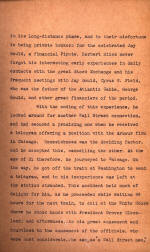 |
|
|
mile012 |
Blank page. |
|
|
|
mile013 |
Page 7 of Autobiographical Essay. Reads:
"the operations of the Treasury, in all its branches.
From that time, until his marriage nine years later, to
Delia Hulburd Gallup, of an old Chicago family, he climbed the ladder of
success in the Armour firm, although he never felt quite at home in that
line of endeavor. He achieved the distinction of being the youngest
manager of a great Department of the firm, ever to be so appointed, having
thousands of men under him, at the age of twenty five. He remained
there until 1910, but after the death of the elder Armour in 1901 he never
felt that the policies of the firm (then the greatest business in the
world) were such as to keep him in fullest sympathy. To him and his much loved wife were born four children,
all at their home at #309 East 53rd street, Hyde Park, in Chicago, between
1898 and 1906, - Edward, Marjorie, Eleanore, and Hulburd. In the
Spring of 1907 the family moved to Kenilworth, a North Shore suburb of
Chicago, to a very delightful home purchased by him from his savings.
There they were happy, and made some lasting friendships. In June,
1913, they moved to the"
|
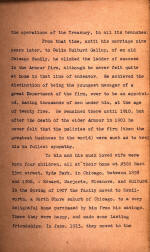 |
|
|
mile014 |
Blank page. |
|
|
|
mile015 |
Page 8 of Autobiographical Essay. Reads: "beautiful city of
Asheville, North Carolina, because of the necessity of Delia Gallup Miles
for a milder climate of higher altitude; she having developed a trouble
resulting in a permanent bronchitis. There, after a year's trial
residence on Victoria Road, they decided to build their home, and
purchased land in Albemarle Park, on the North side of the city.
This home, 'Breezemont' is a delightful place set in naturally picturesque
grounds and having superb views of the city below and the great mountains
to the West. At this writing, in 1933, they are settled there, with
the two youngest children unmarried, and the others married and settled
elsewhere.
Apart from the facts given up to this, the life of
Herbert de la Haye Miles is not very distinguished, but is nevertheless
full of incident not altogether common to every citizen. The high
lights of his life might be set down as follows:
1. His meeting and experiences, in early business life in New York,
with historic personages o the old Wall Street school.
2. The influence of a saintly mother and a ..."
|
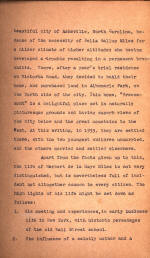 |
|
|
mile016 |
Handwritten note. Reads:
"You will make a good + successful man. You can study + improve
yourself out of office hours -- + I advise you to learn French and to
cultivate your [?] for [?]. You are a good boy naturally + you
have got a better chance now than smart boys have for a start in the
world + it all depends on yourself + your own good sense in improving
your opportunities. Let me hear from you often, I shall be very[?]
glad to, + we must depend on you for the news as Willie is so busy.
I am doing my will, just sent getting [?] better [?] nervousness[?].
I hang your circular up in my office as an art[?] for you. Love to
Willie -- I will write to him soon. --
Your afft. Father F.B. Miles" |
 |
|
|
mile017 |
Page 9 of Autobiographical Essay. Reads: "Vanderbilt Hotel; in
1930-31, he initiated the movement to have Congress grant to Asheville
the "Post Office Park" adjoining the Miles Building, and with help from
George Stephens and our representatives in Washington, finally got it
through successfully, in spite of heavy opposition from the Treasury and
the natural lack of interest in congressional circles. In retrospect, Herbert de la Haye Miles looks back upon
his life -- as most men do -- as full of errors and of opportunities
lost, both material and spiritual. He will say at the end, as did
Cecil Rhodes of Africa "So little done; so much to do". He has had
his small successes, and his for the most part deserved,
disappointments. He has lived to be involved in this year of 1933,
in the world struggle socially and economically, which may level many
things, and which he hopes is all for the best. He is blessed with
a good wife, descending into the shadows with him, bravely; and children
who are all good citizens, good christians [sic], and good Americans." |
 |
| |
|
mile018 |
Photograph, caption reads:
"Ella Victoria Smith Miles: Toronto, 1895." |

 |
| |
|
mile019 |
Photograph and note. Photograph caption reads:
"Ella Victoria Smith Miles, Chicago - 1895."
Note reads:
"God is very good tho to us all + let us 'trust Him with all our
heart + in all our ways acknowledge Him, + He will direct our paths.'
May He bless you greatly dear.
Very lovingly
Mother |

 |
| |
|
mile020 |
Photograph, caption reads:
"Mother of Frederick Billings Miles 1888. Eliza Delahay Miles
(Cushman)" |

 |
| |
|
mile021 |
Unidentified newspaper articles. First article reads:
"'THE DIFFERENCE'
Some of the differences between the Pilgrims and the
Puritans are:
(1) --The Pilgrims came to the New World in 1620 while
the Puritans settled in the Massachusetts Bay Coloney [sic] ten years
later, 1630.
(2) --The Pilgrims made an honest effort to give to
others that freedom in matters religious they themselves had sought to
find in coming to New England. Therein they differed radically
from the Puritans.
No American has stated this difference more clearly
than the late Senator George Frisbie Hoar. 'The Massachusetts Bay
Puritans,' he says, 'had a capacity for an honest hatred, of which I
find no trace in Pilgrim literature.' 'A personal devil,' he added
humorously, 'must have been a great comfort to our Massachusetts
ancestors (Puritans) as furnishing an object which they could hate with
all their might without violation of Christian principles.'
(3) Charity was in very truth the greatest quality with which the
Pilgrims were abundantly endowed and which the men who settled in and
about Boston lacked.
The terrible story of witch persecution in the Bay
Colony (Puritans) constitutes the blackest chapter in the history of
that settlement. However, witchcraft was made one of the capital
crimes in the Plymouth laws of 1636. In this respect the Plymouth
Colony was not unlike the Colonies of Massachusetts Bay, Connecticut,
Manhattan, Virginia, Maryland, and Pennsylvania, but it was unlike some
of the others in that there were very few witches within its bounds, and
that the authorities were definitely indisposed o convict persons
charged with the crime of witchcraft.
As a matter of fact only two cases were ever brought to
trial in Plymouth, and no witch was ever executed there.
One hundred and two passengers, besides the crew
of the Mayflower were crowded into the vessel that was intended to carry
about half that number. They slept on damp bedding and wore musty
clothes; they lacked exercise and water for drink and cleanliness.
Under such conditions they had lived for nearly ten weeks, shut in amid
discomforts of all kinds.
First wash day in New England. 'On Monday,
November 23, 1620, our people went on shore to refresh themselves and
our women to wash, as they had great need.'
Of the 102 passengers on the Mayflower, 29 were women,
but 15 died during those fateful months of 1621. These were women
with frail bodies, like Rose Standish and Katherine Carver, but there
were strong physiques and dauntless hearts sustained to great age,
matrons such as Susanna White and Elizabeth Hopkins, and young women
like Priscilla Mullins, Mary Chilton, Constance Hopkins, and our own
ancestor, Elizabeth Tilley.
Writing in 1910, John Mansfield said -- 'A generation
fond of pleasure, disinclined toward serious thought and shrinking from
hardship, we find it difficult to imagine the temper, courage and
manliness of the emigrants who made the first Christian settlement of
New England.'
Equally important with the idea of civil and religious
liberty, which the Pilgrims brought with them from Holland, was their
enduring respect for the Golden Rule. So we find the Pilgrims
without the intolerance and religious bigotry which darken so many pages
of Massachusetts Bay history. On this account it may really be
said of them that they established at Plymouth 'Freedom to worship
God.'"Second article inscription reads: "Written New York 1885 age 19"
Article reads:
"Waberley Magazine 1885 Boston.
Character.
Oh, how inscrutable a thing and deep--
Abiding in the soul of all mankind
To make or mar each destiny and career--
Is character! Some men its promptings show
As clearly as the summer's mirrored streams
The sky, whilst others are as close and dark
As river Styx, and ne'er disclose to view
Whether their motives God or Satan rules.
Most truly 'tis the fount of every good
And every evil that is done on earth,
Of war and bloodshed, misery and vice,
As of all goodness and self-sacrifice!
The character of every man is made,
Ere 'tis completed, of four parts. The first
Is that he doth inherit at his birth;
The next his parents in their love do mould;
The third is in him made by his free will;
And last --which all through life is being formed,
And oft conflicting with the others, makes
Much doubt and trouble in his breast --is that
Which moulded is in him by circumstance.
Ah, truly is our progress in this life,
As also fate in that which is to come,
Much influenced by the treatment we are given
By those our fellow-mortals, who, with God,
And with our parents, and our own free will,
Take part to form and mould our character!
HERBERT D. MILES" |

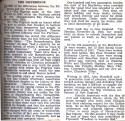
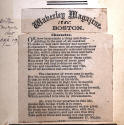 |
| |
|
mile022 |
Wedding invitation and announcement. Inscription at top of page
reads: "Our Wedding --Jan 12, 1897" Invitation reads:
"Mrs. Benjamin Ela. Gallup announces the marriage of her daughter Delia
Hulburd, to Mr. Herbert de la Haye Miles. Tuesday, January the
twelfth, eighteen hundred and ninety seven, Chicago."
Newspaper announcement reads:
"Gallup-Miles
Miss Delia Gallup and Mr. Herbert D. Miles United.
The marriage of Miss Delia Gallup, youngest daughter of
Mrs. Benjamin F. Gallup of No. 1710 Indiana avenue, and Mr. Herbert D.
Miles took place last evening at 7:30 o'clock at the home of the bride's
mother.
The decorations were all in green and white, and Rev.
Simon J. MacPherson officiated in the presence of fifty relatives and
friends.
Miss Eloise Gallup, the bride's sister, was the maid of
honor, and the bridesmaids were the Misses Ella Peacock, Annette Ream,
Edith Miles, and Mary Bacon.
The best man was the groom's brother, Mr. Frederick
Miles of New York.
The bride wore cream satin, with a tulle waist and a
veil of tulle. She carried a cluster of lilies of the valley.
The maid of honor was in pink and white silk and
carried bridesmaid roses.
Two of the maids wore white gauze over white silk, and
two wore green gauze over white silk. All of them carried
bridesmaid roses.
Tomaso provided the wedding music.
After a trip to the South Mr. and Mrs. Miles will be at
home at No. 4865[?] Madison avenue Tuesday, Feb. 23, from 3 to 6 and
from 8 to 11 o'clock." |
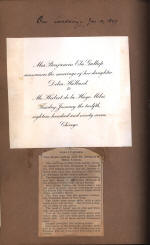
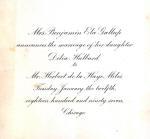
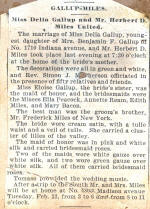 |
| |
|
mile023 |
Two photographs. Top inscription reads: "Delia Hulbard Gallup:
1896" Bottom inscription reads: "Ella Victoria Smith Miles
--1866" |
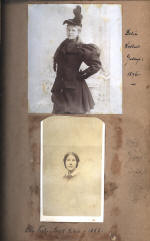
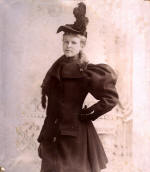
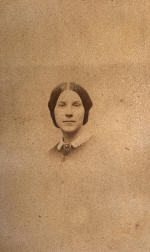 |
| |
|
mile024 |
Reviews of Herbert Miles' book, The Science of Currency and Centralized
Banking. Reads:
"Epitomizes the entire work of the National Monetary Commission and
the entire basis of the Aldrich Plan.
It is the book that has brought forth from the scientific bankers of the
land unstinted praise and not one note of criticism.From the East:
Paul M. Warburg, distinguished writer on finance, and a member of
the international banking house of Kuhn, Loeb & Co., New York:
'As a whole your work is most commendable and will promote a healthy
general understanding of the foundation upon which the Aldrich Plan is
built.'
Samuel McRoberts, Vice-president of the National City Bank of New
York:
'I think the idea is both clever and a timely one, and the book will be
much in demand.'
Hon. Edward B. Vreeland, Vice-chairman of the National Monetary
Commission:
'Your book will be valuable to tens of thousands who have not time to
read the fifty odd volumes published by the Commission, but who desire
to get a general idea of what is to be learned from this great library
of financial information.'
From the Central West:
David R. Forgan, President National City Bank of Chicago:
'Mr. Miles has done the work with great ability, putting in clear and
readable form the gist of the great currency discussion. Few men
have time to wade through the publications of the Commission, and Mr.
Miles has thus done a great service to the public, and to the cause of
currency and banking reform.'
Geo. M. Reynolds, President Continental-Commercial National Bank
of Chicago:
It is a concise, condensed history of banking in the important countries
of the world, which I believe will, if read by students of finance, be
very helpful in the campaign of education which is now being waged in
the interest of currency reform." |
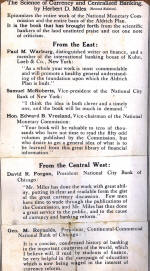 |
| |
|
mile025 |
Two photographs. Top inscription reads: "Father and Son:
1900. (Edward.)" Bottom inscription reads: "Mother and
Son: 1899" |
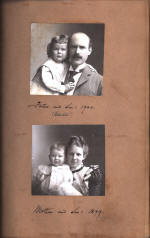
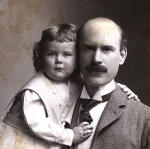
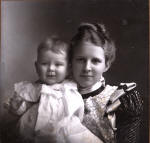 |
| |
|
mile026 |
Three photographs and an unidentified newspaper article.
Top inscription reads: "Gallup Manor: Rochester
Wisconsin."
Middle inscription reads: "Delia Hulbard Gallup --about 1890.
age 13"
Bottom left inscription reads: "Edward G. Miles 1913."
Newspaper article reads:
"THE ASSEMBLY ROOM.
A Triolet.
Conning and whispering the students sit
In a New Trier assembly-room,
Con for a while, and then whisper a bit:
Conning and whispering the students sit
Tearing up paper and scattering it,
Quite a mess for the janitor's broom;
Conning and whispering the students sit
In a New Trier assembly-room."
|
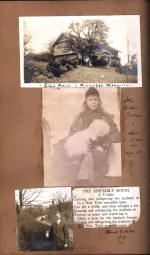

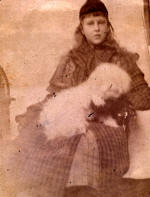
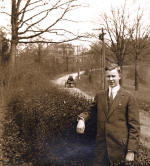
 |
| |
|
mile027 |
Two photographs. Top inscription reads: "The House where
Edward, Marjorie, Eleanor, and Hulbard were born: 309 East 53rd
St. Chicago: Marjorie and Eleanor in their Bonnets." Bottom
inscription reads: "The House purchased by us, Abbottsford Road,
Kenilworth, Illinois, lived in from 1906 to 1913." |
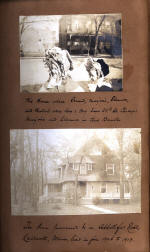
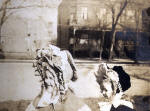
 |
| |
|
mile028 |
Inscription reads: "Original sketch for 'Breezemont.'" |
 |
| |
|
mile029 |
Three photographs. Top inscription reads: "'Breezemont,' built
by us in Albemarle Park, Asheville, 1914." Middle inscription reads:
Breezy Beach, 1913.
Bottom inscription reads: "In 1914. H. D. M. on 'Blasty'[?]" |
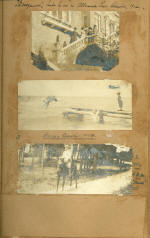
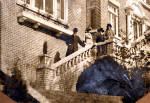

 |
| |
|
mile030 |
Inscription reads: "Two Favorite Poems: (Early)" |
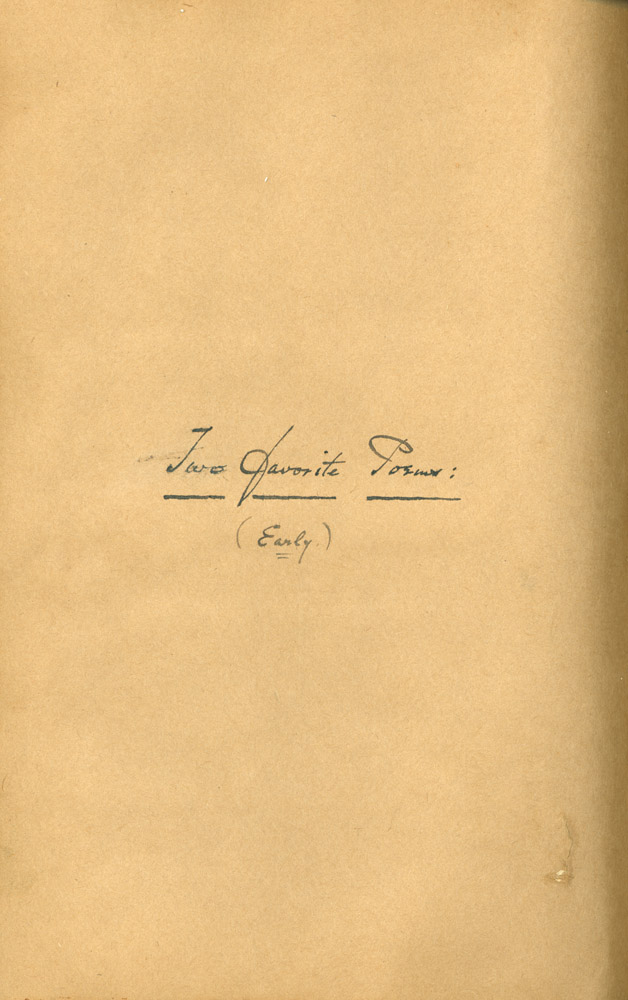 |
| |
|
mile031 |
Text of poem reads:
"What are the joys that men pursue
When wearing care would be forgot?
Are they the joys, so calm, so true,
That thou, O mirrored Lake, breathe thro'
The poet-soul, distraught?Are they the joys this cool, green place
Doth to the gladdened sense unfold,
This bank, whose fringe of daintiest lace
Steals from the Autumn's sunset grace
Its rarest purple-gold?
Are they the joys of trembling boughs,
Of the sweet blue that gleams between,
Of myriad insects' brief carouse
Swelling the wildwood's Summer vows
In one triumphant paen?
Are these men's joys? Or seek they those
That flare a fever through the blood?
Uprooting reason, as it flows,
Till what would banish, makes their woes,
In ever-increasing flood?
O know that real joys are calm,
Ye who would feverish rest pursue!
True joys will bear no after-qualm,
They banish care in nature's balm
That rests in all that's true!
(One of the earliest; 1881; age 15.)" |
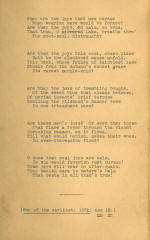 |
| |
|
mile032 |
Copy of Edna St. Vincent Millay poem. Miles' inscription
reads: "The finest poem of the post-war Era --1918-1940" Poem
reads:
"O world, I cannot hold thee close enough!
Thy winds, thy wide grey skies!
Thy mists that roll and rise!
Thy woods this autumn day, that ache and sag
And all but cry with colour!
That gaunt crag
To crush! To lift the lean of that black bluff!
World, world, I cannot get thee close enough!
Long have I known a glory in it all,
But never knew I this;
Here such a passion is
As stretcheth me apart --Lord, I do fear
Thou'st made the world too beautiful this year;
My soul is all but out of me --let fall
No burning leaf; prithee, let no bird call." |
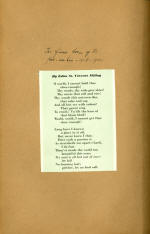
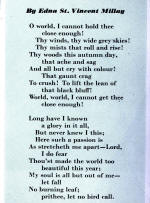 |
| |
|
mile033 |
Text of poem reads:
"SEA CHANGE
(Written upon seeing Hulburd, in 1910, four years old, building
Castles on the Shore, at "Breezy Beach" Mackinac Island)Where the
waves linger, lapping the sands,
Marvelous things there be;
Miracle Castles, builded of Drift,
Builded a poet-architect's gift
To his domain by the Sea!
Find you no battlements? no frowning Towers?
Driftwood and sand -- no more?
Nay, here's a sea-world made of dreams;
Who enters, must unseat what seems,
And be a boy, of four!
Here is his Keep, whose guarded walls
Display a fearsome art --
Behold his bold battalions drill,
Hark to the call of bugles shrill!
He sees and hears, brave heart.
Scorn not, thou worldly, falsely wise
Who find but Drift in sight;
What know we of that vision tense,
Of childhood's rarer mystic sense,
Its clearer inner-light?
O strange array of driftwood dreams
Known to the Summer's wave!
O tender boy of dancing eyes
You've found the old world's rarest prize --
The faith God gives the brave;
You've found God's key to happiness;
To quiet peace, and more;
Heaven's kingdom is of such as you,
The dauntless, the undoubting, true --
My little boy, of four!" |
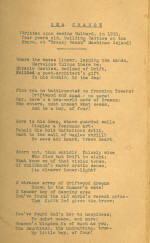 |
| |
|
mile034 |
Unidentified newspaper clipping. Reads:
"'It's no secret,' Mr. Rosten said, 'that the public response to
poetry has been diminishing for a couple of centuries. It may be
that prose has overwhelmed poetry in the historical sense. It has
certainly proved to be more functional, adaptable, and daring.
Look at Wolfe, Hemingway, Joyce. Nevertheless poetry will go on
with or without an audience --and when was there ever a large audience,
anyway? Never. So what's the fuss about? Why blame
publisher, poet, or public? Chamber music never did go well in an
oversize hall." |
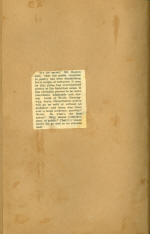 |
| |
|
mile035 |
Unidentified newspaper article. Reads:
"A REAL ARCHEOLOGICAL DISCOVERY Through the
efforts of Herbert D. Miles, a descendant of our Pilgrim ancestor John
Howland, an important and valuable discovery has been made that is of
particular interest to members of our Howland Society.
It is the original Bond (1672) buried in the record
files at Plymouth, Massachusetts, as made and signed by Elizabeth Tilley
Howland, as executrix, and her two son-in-laws,, [sic] John Chipman and
John Gorum, the wax seals still in tact, and signatures of the
witnesses.
The following is a copy of this historic Bond:
'Know all men by these presents that Elizabeth Howland
of the Town of Plymouth in New England in America, widow, and John
Chipman of the Town of Barnstable, yeoman, and John Gorum of the Town of
Barnstable aforesaid, yeoman, do hereby acknowledge our bond to be
firmly bound and obliged unto the Governor and Court of Plymouth
aforesaid in the sum of three hundred pounds "etc., etc. Anno dom, one
thousand six hundred seventy an two.
'The condition of the above written obligation is such
that the above bounden Mistress Elizabeth Howland hath obtained of the
Court letters of administration to administer on the estate of Mr. John
Howland late of Plymouth" etc., etc.
Signed sealed and delivered in the presence of
The Mark of Elizabeth Howland (Seal)
The Mark of
Ephraim Morton John Chipman (Seal)
William Crowe John Gorum
(Seal)
Mr. Miles writes: 'The above is, I believe, one
of the few ORIGINAL documents in existence of a noted passenger in the
Mayflower, as personally signed and sealed - not a transcript by a
recorder, as are most now on record. It is perhaps the only one in
the Howland line, and I believe is unknown to the Howland Society.
Both Wills as on record, (John Howland, in Plymouth, and Elizabeth, in
Taunton) are merely recorders copies.'
Other notable Mayflower Colony records were found by
Mr. Miles in the original, in the Record Building, Plymouth. It
was largely through the interest and efforts of Mr. Miles that the
Lothrop Hill Cemetery in Barnstable was taken care of in a way fitting
its historical importance, for here is buried Hope Howland Chipman, a
daughter of the Pilgrim John Howland. he also has taken a picture
of the Browne Lot in the old Burying Ground in East Providence, Rhode
Island, in which Elizabeth Tilley Howland is supposed to be buried.
One of our first and most important duties should be to
erect a suitable stone in this cemetery to her memory." |
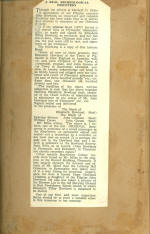 |
| |
|
mile036 |
Copy of Alfred, Lord Tennyson's Poem "Crossing the Bar." Miles
inscription reads: "My favorite poem." Poem reads:
"Crossing the Bar
Sunset and evening star
And one clear call for me
And may there be no moaning of the bar
When I put out to sea.
But such a tide as moving seems asleep,
Too full for sound or foam,
When that which drew from out the boundless deep
Turns again home.
Twilight and evening bell
And after that the dark
And may there be no sadness of farewell
When I embark.
For tho' from out our bourne of time and place,
The flood may bear me far,
I hope to see my Pilot face to face
When I have crossed the bar." |
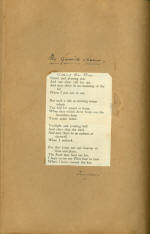 |
| |
|
mile037 |
Unidentified newspaper article and one photograph.
Article reads:
"GOVERNOR MILES.
We find another descendant of the Pilgrim John Howland
who is honored by being elected Governor of a state Mayflower Society --
Herbert D. Miles, Governor of the Society of Mayflower Descendants of
North Carolina.
In his letter sent to members, I quote the following
which undoubtedly will be of interest to our readers:
'Our Society is decidedly NOT merely a social
organization nor is it a society of "ancestor-worshipers" either.
All Societies must have a social side.
Our National headquarters tries to have general
patriotic and legislative objectives, to combat anti-American influences,
and we must help them. But our main purpose in every State, is to
preserve both the spiritual and the physical heritage which we have from
Plymouth. Also to defend and spread those principles of human
behavior and government, brought into being by our ancestors there.
We do this, at a time just now, when our country is being dominated more
and more by citizens of modern European background. For this,
chiefly, we band together; and our main work is quiet and personal, in our
own communities.'
From our acquaintance with Governor Miles as well as in
our correspondence, we find he is much interested in the work we are
doing, and some day in the near future, we hope to welcome him as a member
of the Howland Society."
Photograph inscription reads: "Delia at Eleven years of age." |
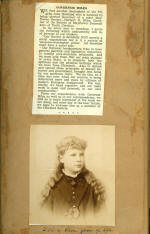
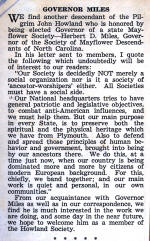
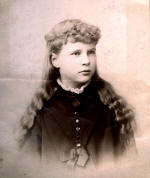 |
| |
|
mile038 |
Two unidentified newspaper articles. Inscription at top of page
reads: "Bottled-up energy, coming out in Kenilworth. 1908." First
article reads:
"New Interests Are Identified With Local L Road Consolidation.
SHOULD HASTEN DEAL
Exchange of Illinois Tunnel Securities Is Now Assured.
New Investment Firms --Metropolitan Elevated Traffic -- Union Bag Earnings
-- Commonwealth-Edison
It develops that two distinctly separate interests are
now at work on plans for consolidating the elevated railroad interests of
Chicago. Herbert Miles, of Armour & Co., is the latest person to
become identified with the project, although it is stated that
negotiations date back several months. His plan is understood to be
entirely independent of the one President Samuel Insall of the
Commonwealth Edison company is working on. In fact, the principals
are not personally acquainted with each other.
Mr. Miles has had proposals before the boards of
directors of the various elevated railroad companies, although as yet it
cannot be said that anything of a tangible nature has developed along
lines of a basis on which the properties can be put together. Such
progress as he has made is largely in the form of impartial and friendly
neutrality among interests, including the city administration.
Terms same as New York
While no details can be obtained, it is significant
that the Miles plan for consolidation is said to be substantially the same
as the one used by the New York elevated railroad companies, and that the
varying fortunes of the different local interests have not required its
alteration.
Several directors of the various elevated railroad
companies when seen yesterday admitted the existence of double
negotiations, but it could not be learned that anything beyond a few
informal talks with both interests had been accomplished. It is the
general impression, however, that present efforts will lead to a trading
basis of some sort by next fall, as competitive bidding for the properties
should hasten the formulation of a practical plan."
Second article reads:
"BANKING AND CURRENCY SYSTEMS.
Herbert D. Miles, a Chicago man, formerly connected
with Armour & Company, but of late an investigator in economic lines, has
just published through Rand, McNally & Co., a book entitled 'The Science
of Currency and Centralized Banking,' which will prove a great convenience
to the large number of people who wish to know the principal facts of the
financial systems of the world but who lack the time and patience to go
through the great mass of literature on the subject. The book is
timely now, when the subject of a new system for this country is under
discussion. The work is largely the result of a thorough study of
the books that have been published under the auspices of the national
monetary commission. These books were written by men especially
qualified and comprise a rather good-sized library of economics in
themselves, running up to many thousand pages, but the ordinary man cannot
read them with any degree of thoroughness. Mr. Miles has read them
all and with his previous knowledge of the subjects has been able to
extract and collate the important facts. Senator Aldrich is so
pleased with the work that he has adopted it as the final summary of the
work of the commission -- the last issue. You c an learn more in
regard to the banking and financial systems of the world from this book in
one evening than from any other with which THE ECONOMIST is familiar." |
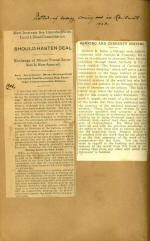
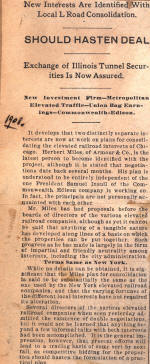
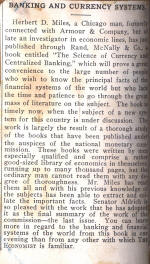 |
| |
|
mile039 |
Unidentified newspaper obituary, 1910. Inscription at top of page
reads: "Edward Gallup Miles' Namesake - 'Uncle Edward'" Obituary
reads:
"EDWARD PAYSON GALLUP
Death of One of State's Wealthiest Men in Lebanon.
Special to The Union
LEBANON, Jan. 14. --Edward Payson Gallup, one of the
wealthiest men in this state, died at his residence on School Street,
about 9 o'clock last evening.
He had been ill for many months and about a year
ago, by advice of his physician, he went to Europe but was obliged to
hurry home on account of his health, and has failed rapidly since.
Mr. Gallup was born seventy-three years ago in the
house where he spent his last days and which had been in t he family for
many years. He was fourth and youngest son of the late Dr. Benjamin
and Susan Ela Gallup, who were old-time residents of Lebanon.
Mr. Gallup left school at the early age of 14 years and
went to Hanover, where he learned telegraphing and was one of the first
operators in that town. For four years he worked faithfully and at
the end of that time went west as train dispatcher for the Indiana,
Evansville and Cincinnati railroad.
Before he was 19 years of age he entered the grain
business, associating himself with his brother, the late William Gallup,
under the firm name of W. & E. P. Gallup, in Indianapolis. At that
time they were situated on the site where the state capitol now stands in
that city.
They were in the grain business for forty years, and a
peculiarity of the business was that it was on a strictly cash basis.
All grain the concern bought they owned, no business being done on the
margin. The business was extremely successful, and at the time the
two brothers had wills made to each other and upon the death of William
Gallup, Edward Gallup came into a large amount of money in addition to his
then large accumulation. In Indianapolis, it was said, that the firm
was a liberal subscriber to all public emergencies, but, never signed its
name to a paper, always marking "Cash."
Mr. Gallup retired from active business forty years
ago, and later returned to his native town to spend his remaining days.
He travelled extensively and had made more than a dozen trips abroad.
Mr. Gallup was a rather eccentric man and during the later years of his
life lived rather quietly. He was a philanthropic man and the world
will never know how much he did for charity, owing to his quiet manner.
Many times large orders of groceries have been brought to poor and needy
families in this village which were sent by this man." |
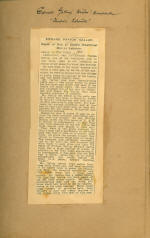
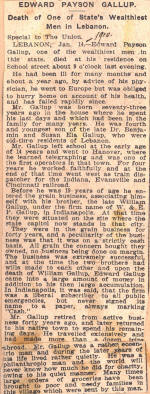 |
| |
|
mile040 |
Letter from President of the National City Bank of Chicago to Rand,
McNally & Company. December 31, 1910. Letter reads:
"Gentlemen: -
I have read with great interest "The Science of
Currency and Centralized Banking" by Herbert D. Miles, being a digest of
the publications of the National Monetary Commission. Mr. Miles has
done the work with great ability, putting in clear and readable form the
gist of the great currency discussion. Few men have time to wade
through the publications of the Commission, and Mr. Miles has thus done a
great service to the public, an to the cause of currency and banking
reform.
I have pleasure in ordering five hundred (500) copies
to be distributed among our clients.Yours very truly,
[?]
President" |
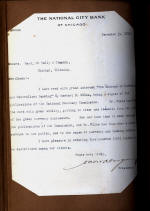 |
| |
|
mile041 |
Two unidentified newspaper articles, 1911.
First article reads:
"WRITES OF OUR CURRENCY
Herbert D. Miles, formerly connected with Armour & Co.,
has just published an exceedingly interesting little book on "The Science
of Currency and Centralized Banking," which will be of great value to the
business man who is too busy to wade through the voluminous discussions of
the various problems now confronting this country. The book is a
study of the publications recently issued by the national monetary
commission, and the work reflects great are and research on the part of
the author in the preparation of the treatise on banking reform.
Starting with the broad statement that the science of banking, including
the development of credit, is an inexact science, the author traces
briefly the development of the banking systems of this country and Europe;
discusses gold reserves, crises, and American methods, pointing out the
weaknesses in our own system, the lest of which is our present law
requiring a fixed and immobile reserve; noting that the central bank is
the heart without which the most enlightened European national banking
systems could not exist; suggesting that whatever pure solution of the
conditions facing us is that it must create a situation so liberal,
unhampered and yet guarded that it shall result in all the banks of the
country eventually preferring to operate as 'national banks,' under the
same laws, under one inspection system, and one in their interest covering
currency issue and redemption. He expresses the hope that the
solution will assure the country of an even flow of currency as required,
with perfect ease of redemptions and cancellation; an even control and
reasonable basis of money rates, a stability and resourcefulness in crises
and a use of natural wealth and unparalleled resources that will bring
into being the inevitable American leadership in world finance."
Second article reads:
"Currency Work in Demand
A second edition of Herbert D. Miles' review of the
Aldrich currency plan has been issued. Concerning the necessity for
the adoption of the measure, Mr. Miles says: 'The peril of sudden
country bank demands upon New York for their secondary reserves, might be
successfully handled under the system proposed; but under a perfect
system, the proportion of these deposits will be so reduced as to no
longer constitute a menace, to the consequent greater prosperity both of
the smaller banks and of the country at large.'" |
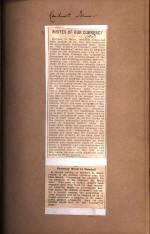
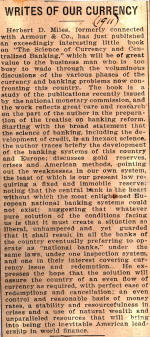
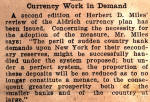 |
| |
|
mile042 |
One poem and one photograph.
Poem reads:
"QUEEN OF THE LAND OF THE SKY.
Viewed from Breezemont the day is done;
Shimmers a city of dreams--of air--
Floating in marvelous atmosphere,
Far o'er the Pisgah range, the Sun
Bathes the mountains, stills his fires,
Pours his gold upon roofs and spires;
Lingers long, loath to flame good-bye
To Asheville, Queen of the Land of the Sky.
From old Beaumont and White Fawn Gap
Now in the East, the Sun looks down,
Still on a shimmering, beautiful town,
Nestling within the mountains' lap.
But this is the morning of deeds, not dreams;
This is a city that is, not seems;
A city that works; whose goal is high, --
Asheville, Queen of the Land of the Sky.
Royal and rare is your diadem,
Of circling mountains, fold on fold,
Far and near, of green and gold,
Great Pisgah for your proudest gem!
No other city, small or great,
God gives to sit in nobler state;
Noblesse olige! fear not, aim high,--
Asheville, Queen of the Land of the Sky!
--Anonymous
Photograph inscription reads: "Breezy Hollow" Lake Lure
[Boat House.] *Note: [Miles was the largest investor and land-owner at
Lake Lure during his time.] |
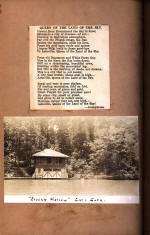
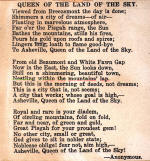
 |
| |
|
mile043 |
Handwritten inscription: "The War 1917-1918" |
 |
| |
|
mile044 |
World War I era cartoon. Handwritten inscription reads "An English
idea of a War-Slacker."
Cartoon caption reads: "What are you doing to guard the Homes of
England?" |
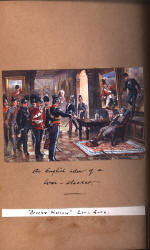

|
| |
|
mile045 |
One unidentified newspaper article [two columns]
First article reads:
"ASHEVILLE MAN HAS POEM IN N.Y. PAPER
Herbert D. Miles, of This City Author of Poem Appearing in New York Times.
One of the features of the New Year's edition of The New York Times,
published Tuesday morning, was a New Year's poem by Herbert D. Miles, of
this city, entitled '1918.' Mr. Miles is well known in Asheville,
and his poem attracted much favorable comment among his friends here.
The poem follows:
"'1918'
The world of men is sundered; it is ours
To picture its Creator looking down
In pity and amaze, Perchance [crossed out], He sighs
That children of His image are become
More wolf-like than the wolf; more pitiless
Than ever [crossed out, inserted "the bold"] famished tiger, hunting prey;
Deeper in craft than Lucifer himself.
Laws, made to bless, whose secrets men have wrenched
Of earth and air and water, are enslaved
To fearful ends. And all the newest reach
Of man's invention, conquering sea and air,
Has turned within its sphere to rend its own.
Ay --this He sees!
But not to Him the rage nor bitter grief
Engendered of war's ruthless garnering,
He knows our blossoming; that late or soon
Chill blasts should [crossed out; inserted "must"] wither, be there war or
peace;
That noble youth, cut short, and the starved child
And [crossed out; inserted "The"] tortured mother, nearer are to Him;
That separation, and its pain must come
In Winter's storm or Summer's; that war's blast
Reaps oversoon, what must be reaped at last.
So the bold warrior's rest, if sooner come,
Is no more fearsome, no more sure, than his
Who plows untouched in earth's remotest spot;
Than his who hunts the endless reach of ice;
Than his who dwells by languorous tropic seas,
For all, the rendezvous; for all, the pain;
For all, the passage. What a little span!
One score of years or fourscore --is it great
Which length proves our inheritance?
Great is seems
To him whose earth-bound vision clings to earth
As clings a meanest [crossed-out] parasite to its host;
Great to the base, who consecration shun;
And great to them who know not tears nor prayer;
But never great to him who goes to war,
Not driven by feudal lord; cradled in liberty!
The soldier-soul, gay, careless --that is faith,
Faith of true instinct, trembling not in fear;
Faith in God's keeping! Sacrifice untaught,
Death's call, for such [crossed out, inserted "him"] spells not oblivion
Eternity is his....God's heart!
Has he not lived, and loved!
HERBERT DE LA HAYE MILES" |
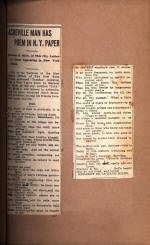

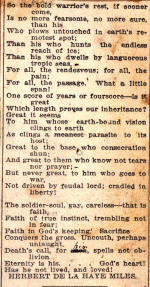 |
| |
|
mile046 |
Asheville Times article Sunday, October 7, 1917, containing letter from Edward Miles
describing life at the war (continues on next page). Part I of
article reads:
"With the Ambulances Under German Fire at Craonne
By EDWARD MILES.
[At the request of The TIMES the family of Edward Miles
consents to the publishing of the following remarkable letter. It
brings home to us all, perhaps as nothing else can do, what is going on,
and changing the world, when an Asheville boy of nineteen can in three
months after his leaving here say: 'For the brief balance of the
night I slept the sleep of exhaustion in that tiny cellar, sitting up, as
there was no room to lie down, my head upon my knees, with a dead French
soldier in the doorway, four live ones tucked around inside, and a dying
man, convulsions, on a straw pile beside me, his blood dripping on my feet
and coat, and his hand intermittently hitting my helmet. Above us,
as I slept, they told me, our spot was hit four times.']
The full letter follows:
'Three months, today, in the Service -- and what a time
it has been! Our last little venture at the front was taking care of
the sector at Hurtebise. This time it is Craonne -- it is all
right to tell you now. After what I've been through this present
brief duty at a hospital is Heaven, and I'm as happy as a king. Just
think, for two whole nights I'm to sleep on a real bed, on straw almost
two inches thick, and stretched over a steel frame that almost is remotely
like a spring. Don't you ever worry about my being able to sleep!
I could write letters and letters upon the kinds of things I have slept
through. Through aeroplane raids, with bombs bursting all around,
and without shelter. Through French batteries, blazing away on all
sides so near me that the earth shook continually with the shocks and my
ears were dulled. And I have slept in little abris a couple of feet
underground, with German shells raining all around and keeping the earth
all a-tremble. Oh, I can always sleep. The soldiers lack our
variety. And I could write several letters on the kind of beds I
have had, and even of the varieties of bugs and fleas carried away as
souvenirs. The oars on the life raft on the 'Rochambeau' -- lovely
bed; -- the wooden seat of the railway car, going to Paris; a couch, of an
iron frame and a piece of canvas; a pile of straw on the ground; my
stretchers, hung up inside my ambulance; in the military beds, in dugouts
-- a wood frame, very short, with chicken wire stretched across it, built
one above the other. And I have slept sitting in chairs, and lying
on wooden benches, and on the cold, cold ground. And I have slept on
the front seat of the ambulance when my partner was driving, and twice,
for a minute, when I myself was driving, and in pitch dark, of course.
Oh yes I can always sleep, and in circumstances ever changing. Day
or night -- rats men or cannon -- nothing can keep me from sleep!
'The hole through this paper is from a "105" Boche
shell which hit it. It's the third outfit of my letter paper smashed
like that. It was when my latest car was blown up -- but that was
not so exciting. I must tell you of the singular adventure when my
first car was destroyed, for I am still rather dazed to find myself and
partner alive to tell about it. This is the first letter I have been
able to write for quite a time; four of our cars were lost, and two of our
boys killed, in that awful battle, and it is agreed that Brownie (my
partner) and I were in the worst stretch of all, so we had small right to
sur" |
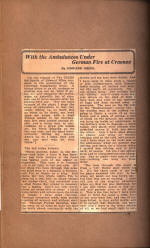
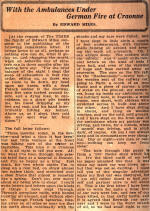 |
| |
|
mile047 |
Continuation of article above, in two columns.
Part II of article reads:
"[sur]vive. It was not a battle of hours, or even days, running
almost two weeks. Several times I have been on continuous duty for
eighteen hours, and once went almost three days and two nights without
sleep, and never between trips more than a half hour's rest. So you
see I couldn't write much -- I slept the greater part of two days, after
that. Well, here goes: Our section (No. 66), 20 good cars and
45 good men at the beginning, and 16 battered cars and 43 battered men now
-- alas -- carried 1,771 wounded altogether in the battle. And that
through shell fire almost all of the time, for three or more of the five
miles back to the hospital. And in the dark and by the dead, roads
full of supply trains going both ways, often through woods, and up and
down hill, and dodging shell holes. And that awful gas.
A Night in Hades.
'We were awakened, Brownie and I, at 12:30 a.m. of that
fateful night. Boule, came down and told us a car was needed to go
at once to V.N. -- the very front. The Germans were like tigers, and
ready to sacrifice anything and any number of men, at Craonne. I
don't see how we ever did it, but we did get as far as V., although the
road we took was being shelled and full of holes, which we were lucky
enough to miss. We were running through gas, with our masks on,
which made it harder to see in the dark. It was a black night, with
ghostly, ghastly, uncertain light from bursting shells and star shells.
Suddenly we almost ran off the road, stopped just in time, when two shells
almost hit us, one in front and one behind, about fifteen yards away.
We turned and ran through the smoke of the one ahead two seconds after it
had gone off. We were just in V. and crossing a little square
when our gearshift lever jumped from first into second speed and jammed.
A shell had just exploded, and we know now that a piece of it had hit and
broken this gear. There we were, in the midst of Hades, stuck.
We tried for a time, an awful time, under bombardment, to find the
trouble. Some soldiers were filing by and while we stood two of them
were killed and"
Part III of article reads:
"one wounded. The wounded man came over to us, and we took him on.
We gave the car up and carried him, looking vainly for an abri. It
was too dark, so we decided above ground must do. We hugged a wall,
and soon found a hole into which we could crawl. The stones were
thick, and while walls were being hit every minute, and there was not a
building left standing in V., it was the best we could do.
'The excitement of such a situation is intoxicating, in
a way. We certainly did some crazy things. (It was not for
three days after that our tension fully relaxed.) Our blesse wanted
his knapsack, left by our car. He was getting numb, and wanted
brandy, and some coffee in his canteen. Brownie, I suppose as the
older, went first. He got near; a shell burst' he came running back
-- but he had the wrong musette. So I went out. Walked a part
of the way when a big one crashed into some stones at my right and I went
sprawling on my ear, my helmet rolled off, stones fell around me. I
got up, said something, picked up my helmet, and felt myself all over.
Took a breath and then ran to the car. Got the musette, and actually
walked back. I don't know why. Running was safer. The
shells came eight to ten a minute.
'We pondered what to do. Decided we must find a
field telephone somewhere and get another car; our blesse' was badly off.
I started out. Brownie stayed with the blesse.' Thirty yards
and I passed a dead man. Started to make sure, when a shell hurried
me on. Dodged six shells by crouching or falling flat when I heard
them coming. Passed two roads, full of holes and branches of trees,
too unfamiliar looking. I walked and ran and fell on my face or
crouched in holes when I could. It made me feel mighty queer.
There were several very peculiar dents in my helmet next morning.
Soon I made out a white horse and thought I'd ride him. But he would
not move; he was all shot up, and had come there to die. Then I saw
a Frenchman, running around like a chicken with its head cut off.
Found he, too, was after a telephone, so I went off with him. Went
gropingly all over the broken town, took the wrong road, and finally came
back. Same old stunt of run, crouch, walk, and fall.
'We finally found an abri, and I was going out again to
carry back our blesse' when another shell hit close by. The
Frenchman grabbed me by the arm and just would not let me out to do any
more; so, for the brief balance of the night I slept the sleep of
exhaustion, in that tiny cellar; sitting up, as there was no room to lie
down, my head upon my knees, with a dead French soldier in the doorway,
four live ones tucked around inside, and a dying man, in convulsions, on a
straw pile beside me, his blood dripping on my feet and coat, and his hand
intermittently hitting my helmet. Above us, as I slept, they told
me, our spot was hit four times.
'A few days have passed and I haven't mailed this; we
are back once more, in almost the same place, working our heads off at the
front. We are getting to know this Chemin des Dames part of the
country all too well. I can't say much for the weather. It has
been cold and windy and rainy and foggy an muddy and damp, all summer, and
now that fall has come it is only more cold and damp and bleak and nasty.
What will the winter be? Perhaps they will have fresh men, and get
along without us for a time, the youngest of us. Brownie and I are
keeping house in a little dugout at present. A regular palace!
Why, we have three and a half board son the floor. I only have to
double up my huge length three times to enter our spacious doorway --
fortunately we have no door. Lots of fresh air. And we have
running water in the house -- when it rains. Part of the Aisne river
flows in through the door, and there are three gurgling brooks, which come
tumbling down the walls. Private showers. We had company last
night -- visitors -- and they spent the night with us. Two rats and
a toad. Of course there are spiders and bugs and lice who stay with
us all the time. They are our closest friends. They sort of
live on us, don't you know, just as we live on the French government.
Only they make us do all the work -- the favorite pastime of a dog or a
cat. Hurrah! A seven days vacation from September 19th.
Will run down into Italy.'" |
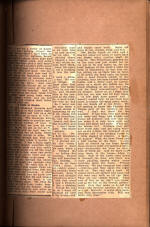
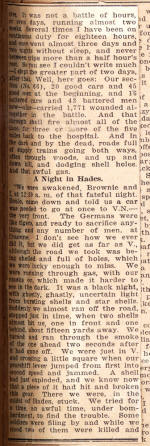
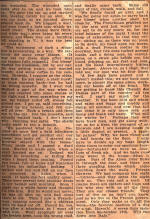 |
| |
|
mile048 |
Asheville Times [?] newspaper article. Reads:
"EDWARD MILES WRITES FROM FRENCH FRONTSays Americans Are in Need of
Uniforms, Socks, Sweaters and Other Articles.
The following brief letter from Edward G.
Miles, on the battle front along the Chemin des Dames, in France, is given
as received by his family here yesterday, on account of its peculiarly
timely reference to certain conditions as exposure and clothing, and the
need of hurrying troops. Mr. Miles is of the Princeton unit, No. 66
of the U. S. Ambulance corps, formerly conducted by the Red Cross, but now
a part of the U. S. army.
'Along the Chemin des Dames.
Nov. 18, 1917
'You say not to be impatient about our boys, that the
old U. S. is wide awake, and its sole business is war. Well, I only
hope you will hurry along a few of those millions of uniforms, shoes, etc.
Our whole camp is greatly in need of regulation clothing and general
reinforcements of that nature, and I am afraid it may be months before we
get much. They are nearly run out of all supplies, in Paris, after
outfitting those Y. M. C. A. boys, etc.
'I will still maintain that it is action that we must
have from the U. S. I'm afraid France spills her blood while so far
we spill mostly printer's ink. I hear that some authorities are
trying to discourage the knitting of sweaters, and socks, and mufflers for
soldiers, saying such things are luxuries. You bet they are
luxuries. But blamed necessary ones. I would like to see one
of them over here in this cold, and wet, and damp, living as we do, and as
the soldiers do, and then see if he still thinks that a U. S. uniform
minus a sweater, etc., is a thing of joy. No, sir! The U.S.
uniform is too thin for winter work in the trenches. The French and
the English are much thicker. The U. S. socks are of splendid
quality though. And the shoes seem to be good. The materials
are good in all of them, but the suits and the underwear could be thicker.
That is [wh]ere your sweater and muffler and wristlets come in handy.
'This war will not be over in any great hurry, you can
make up your mind to that. But many things looking up. The
Boche prisoners taken in last advance near here, over 11,000, were mostly
very, very young, some as young as fifteen. I saw them.
'It is awfully late. I must go to bed quick. It
is 7:30! Lights go out when the sun is out. Up before the sun.
The boys will sure miss their camp comforts when they get over here.
But I'm getting fat -- for me -- on it! It's a great life.'" |
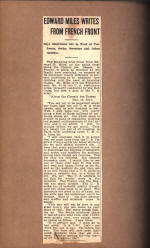
 |
| |
|
mile049 |
Asheville Times [?] newspaper article in two columns. First
part reads: "TELLS HOW ONE HUN 'PLANE IS ACCOUNTED FOR
Gives Vivid Description of Reception Tendered the Germans by French
Anti-Aircraft Guns.
The following description of a German air
raid, in which at least one Boche plane was accounted for, was written by
an Asheville boy now serving with an ambulance corps in the thick of the
fighting in France. The name of the writer is withheld by request.
His description of the raid and the fighting that ensued show an intimate
knowledge of the ways of the Huns in introducing 'kultur' and will be read
with interest by his friends in this city.
The letter, which is dated 'Along the Chemin des Dames,
February 1, 1918,' is as follows:
'Five minutes ago there was nothing more exciting to
report than an air raid last night -- air raids are too common for notice
or description, though fellows in the cannon service or in Paris are quite
thrilled by them, I believe. But -- there are air spectacles that
are spectacles, and five minutes ago, when I was reflecting that it was
going to be a tame day, from our of the heavens came the whirr of a Bosche
plane speeding in our direction. It was high, very high, when first
we saw it, but as it drew nearer it rapidly descended, dove, almost, to a
height of about 1,000 feet. And as it came lower a mighty uproar
broke loose. Anti-aircraft guns belched forth screaming shrapnel
shells from every hillside, which broke all about the rushing plane in
puffs of black and white. On it flew, toward our huge French 'saucissee'
(observation balloon) close by.
'Then came the rat-tat-tat of many machine guns,
spitting out wrathfully a torrent of bullets, vainly trying to check the
oncoming Germans. When perhaps half a mile away the Bosche plane
opened fire on our balloon. Both our observers at once leaped for
safety -- a thousand foot drop -- as over each man's head his great white
parachute gracefully unfolded, as it caught the air. Things were
happening, and happening quick. All this took less than two minutes.
At last! The vast bulk of our balloon was pierced through the top;
an incendiary bullet had found its mark; it crumpled a bit, and then burst
into flame. But the German had all this time been flying nearer, to
make sure destruction, and it took him just ten seconds too long! He
turned, and started to rise. But right there he was in for a little
surprise. The rattle and roar of our land guns suddenly ceased.
Two French planes, with motors roaring, tore upon the scene. Battle
planes they were and out for vengeance. All this, in another half
minute. They were swifter than the German, and quickly closed in
upon him, slightly above and behind. At once the Bosche curved and
twisted, trying to"
Second part reads:
"out-maneuver them. But his every move was countered on the instant
by the foremost of the French planes, which jumped to the offensive.
At length the German, finding himself beaten at every turn, dove headlong
as a last resort. But our man was game; he boldly dove after him,
scarce a hundred feet behind, his trusty mitrailleuse screaming without
mercy. Three hundred feet from the ground, and the Bosche burst into
flames! The Frenchman checked his rushing fall, and skimmed away, up
and up. He was through.
'A great cheer went up from all of us watching; you can
imagine our suspense and breathless interest. It was well worth the
little risk we ran from the flying shrapnel and hail of bullets dropping
all about us. One gets used to that. Everything was so quick
that almost at the same moment that the enemy plane broke into flame, we
could see our two observers drop gently, with their slow-moving
parachutes, upon the bare hillside, about 300 yards off, and their balloon
drops into a valley. I will go over and see what is left of the
Bosche plane later -- after the burial.
'This is the life! Behold! my "permission" -- two
weeks every four months -- was due, and Jopling and I decided to take it
together, and run down to the old Mediterranean again; Nice, Monte Carlo,
Menone. Jop. is a Harvard grad. and a fine fellow. Soldiers
not allowed in Monte Carlo gambling place, so don't worry; anyhow, you
know I'm on to their curves and would give them the laugh, not my money.
Jop. and I went to Paris first, to the American Univeristy union, then saw
about our "orders de movement," went to a movie, then to the Cafe de la
Regence for a game of chess. Won it. Next day we went to our
banks; then off for the south.
'You are all interested in submarines. Well, Jop.
and I got to the ancient city of Marseilles in the morning. We
decided to get a motor boat and run around the old harbor, and to the
Chateau d'If. from which the Count of Monte Christo was tossed into the
water, sewed in a sack -- peace to his ashes. I guess we saw some
things which, for military reasons, I may not mention. Suffice it to
say that I now know a lot about the anti-submarine warfare in the
Mediterranean, and its plans, which is not hearsay. I have seen the
who, where, when, why, and how of at least a part of it. Have seen
in use many marvelous things. Could say much that would be censored.
Perhaps later.
'Met Allen Williamson, of Asheville, in a most
accidental and casual way. You bet I was glad to see him. That
evening we had a big feed, to celebrate. Canned things and honey and
crackers, all Christmas gifts from loving hearts back home; and hot
chocolate from ditto. Its a great life! Back in the thick of
it again now; all night work and plenty of it.'" |
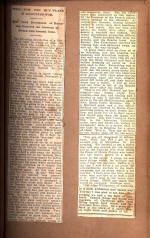

 |
| |
|
mile050 |
Asheville Citizen newspaper article from Edward Miles. Two
columns. Part 1 reads:
"EDWARD MILES TELLS OF ACTUAL CONDITIONS AT FRONT.
Writes Experience to Parents Here. Describes Nine Days' Battle
Greater Than Verdun. The following letter from
Edward Miles, son of Mr. and Mrs. Herbert D. Miles, of this city, who is
at the front in France with his Princeton university unit, is printed at
the request of The Citizen, his family being disinclined to seeming
exploitation. Mr. Miles has an evident talent for presenting a vivid
picture of events as he sees them, and the fact that this is his first
letter describing actual conditions at the front, as the American troops
will see them, gives added interest to Mr. Miles' letter which follows in
part:
ALONG THE CHEMIN DES DAMES, July 23. --'Goodness!
I was all ready to tell you just where we are, but remembered just this
minute that I'm not allowed. However, we are doing "front work" near
Craonne. We are carrying the wounded back to the field hospital, and
are exposed to shell fire for a mile and a half or so, of the trip, and
get fired at good and plenty. German aeroplanes dropped bombs all
over my sweet couch last night, and will again tonight. About fifty
searchlights near us, and anti-aircraft guns banging around. Noise!
O my! Some celebration! But the guns can't hit an aeroplane at
night, except by luck.
'Some of us, Knight, Boule, Condell, Brown, and I, have
made great friends with French officers, and when "en repos," walk around
the hills while they show us the guns, the telephone stations under
ground, and other things. They gave us a couple of "parties."
I brought my mandolin over and played last week, and we had a fine time.
They are all awfully good to us, in more ways than I can say.
'A big battle going on, right near here now.
Between Craonne and Hurtebise and Cerny. Perhaps you will have read
about it. Look it up if you haven't It is a trifle more quiet
this afternoon, but we will probably be running all night. We had
been running three days and nights steadily, without sleep, so I slept all
day yesterday and all this morning. I am perfectly fresh for
whatever may come tonight.
'So much has been going on that I don't know where to
begin or what to say. There was a big German air raid last night.
It was disturbing, to say the least. French shrapnel bursting all
over the sky, and machine guns thick on every hill top blazing away at the
darkness, with about fifty big searchlights roving around the heavens
trying to spot the Bosche planes. Couldn't get them. Never can
at night worth mentioning."
Part 2 continues:
"But they make things uncomfortable for the aviators. Nine days
this battle has raged. The latest is, that it is more important than
Verdun. Our section (No. 66) is just on the edge of it, for front
work. My car is one of the best and the chief watches it closely.
It still holds the record of our section. One of our cars had its
front window (behind the driver's head) broken last night by a piece of
shell. One turned a back-somersault into a pit, in the dark.
One fell in a shell hole, and one hit an auto truck -- all these happened
in the same night. Some of them are still running. Believe me
one has one's hands full trying to pass a truck or wagon train in the
dark, quite invisible. And the shell-holes will move around in the
dark so as to get in one's way --when loaded with couchees, too.
'One night I was called out to one of our front posts.
It was a quarter to 1 o'clock. Pitch dark, except for the repeated
flashes of bursting shells and the more occasional flare of a star shell.
The road was crooked, rough, and winding, over a hill and twisting through
a thick woods. Had no lights, of course. And this running in
the dark is some job, too. I am developing the eyes of a cat.
Can run in the dark now at daylight speed. Spent the rest of the
night sleeping in my overcoat in a cave-house with about forty soldiers
and branchardiers. Lots of bug and rats. Very pleasant.
Every time the soldier in the bunk above me turned over, I got a shower of
dust and mud. My helmet for a pillow. Shells and batteries
banging out a lullaby.
'We are in the middle of a nest of French batteries at
our post, and the Bosches love to shell them. They were shooting gas
shells over here last night. We had to run through the gas.
Smells sweet and harmless, but --it's bad; suffocating; sickening.
'We go into "repos" for two weeks on July 28th.
Will be able to write you more after that.'" |
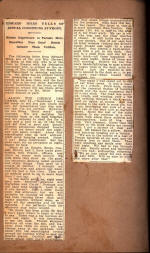

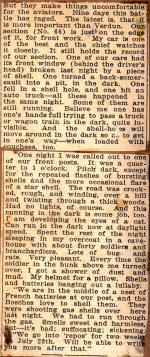 |
| |
|
mile051 |
Two unidentified newspaper articles.
First article includes a handwritten note saying "War work 1918" and
reads:
"Asheville Man Joins Food Administrator's Staff and Is Sent to Chicago.
(By S. R. Winters)
WASHINGTON, Sept. 18. Herbert D. Miles
of Asheville, arrived in Washington today to connect with his duties as a
member of the staff of executives governing the United States food
administrations. He will leave next week for Chicago on his first
important assignment. Mr. Miles had declined an offer to become
attached to the federal trade commission, preferring the job with the food
administration.
'I preferred to attach myself to that band of dynamic
leaders, with ["out" crossed out] little or no salary, surrounding Mr.
Hoover, and who now are holding an immense power and responsibility in
directing the procedure of business ["and" crossed out] running into
billions of dollars yearly," said the Asheville man today."
Second article reads:
"ASHEVILLE BOY CITED FOR CROIX DE GUERRE.
EDWARD G. MILES WRITES INTERESTING LETTER.
Pays Tribute to Work of American Red Cross -- Wonderful Reception of
Americans in Belgium.
The following is an extract from a letter
written by Edward G. Miles, the first Asheville boy to sail for France
after the declaration of war. He tells of the advance, into
Luxembourg, and of his citation individually for the Croix de Guerre:
'It's a great life! I'm all over my hard attack
of influenza; and what is a temporary loss of thirty pounds from my skinny
bones and a month in hospital, anyway, over there? That big piece of
shell that hit my arm September 30, might have hit my head, in which case
there would be more excitement. Right now, we are very nicely lodged
in Wiltz, a place of about 3,500 inhabitants in the Grand Duchy of
Luxembourg. We are very well received. We are leading our army
corps, in following up the retreating Germans, and as a result are the
first in every town, city and village, and pull down the big reception.
It is one wonderful, triumphal march. Ce n'est pius la guerre, c'est
la victoire! Belgium gave us a truly heroic reception. Every
tiniest town of Belgium had set up a triumphal arch at every entrance to
it, with the inscription "Honneur a nost vaillants allies;" "Gloire a
l'entente liberatrice;" "Bienvenu a nos amis allies," etc., while all the
streets were lined with a double row of green fir trees, and with homemade
flags. Children would shout and cheer, old folks wave or salute, and
cries of "Vive l'Amerique;" "Vive la France;" were heard on all sides.
Last night, to celebrate our arrival at Wiltz, there was a torchlight
procession, followed by dancing, while star shells and signal lights
rocketed up all over town, all evening.
'This Thanksgiving we certainly had lots to be thankful
for, especially that we were born in the good old U. S. A. instead of
anywhere in Europe; and the war is as good as over; and in my case
finally, because to my very great joy, surprise and delight, I have been
cited for the Croix de Guerre -- received notice of it, in fact, at our
big Thanksgiving banquet. You know our unit is one of the few Croix
de Guerre ambulance units, have the Croix painted upon our cars for our
work especially last May, when several of us were killed; but, while I
always worked as hard as I could, goodness knows, and have taken whatever
luck came my way, I had long ago given up the hope of any such extreme
good fortune as an individual citation. I didn't win it by any
single adventure, as so many are won, but simply by always doing the best
I could, whatever happened.'" |
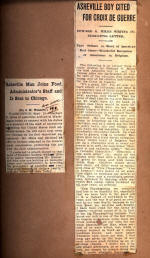
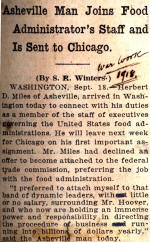
 |
| |
|
mile052 |
Two photographs. First caption reads : "1927 Asheville"
Second caption reads: "The Miles Building 1927 -as remodeled.
Rear" |
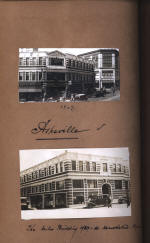

 |
| |
|
mile053 |
Two color images of Asheville. First card reads: "Asheville Club,
Asheville, N. C. 1905. The Miles Building was 'remodeled' from
this building - 1919 and 1927."
Second card reads: "Looking up Haywood Street, from Patton Avenue,
Asheville, N. C. 1905. Asheville Club later Miles Building.
Sondley Building." |
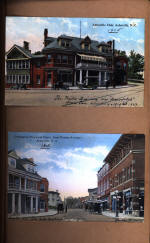


|
| |
|
mile054 |
"Mammoth million-dollar Lake Lure dam nearing completion (August, 1926)is
a masterpiece of engineering. Its height gives 104-foot head and
combines three distinct types: hydraulic core, gravity, and multiple
arch; the latter employing the greater portion of its 585-foot length.
The plant is unique. The water-level is fixed, and can never be
lowered under any circumstances." |
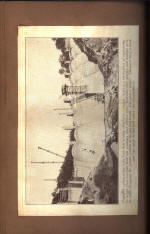
 |
| |
|
mile055 |
Two unidentified newspaper articles.
First article reads:
"About fifty minutes' motor from the beautiful city of
Asheville, North Carolina, over a perfect highway, and through the most
charming of all the charming country running out of that city, there lies
the famous Hickory Nut Gap, and the Gorge of the Rocky Broad river. At the
eastern end of this gorge lies the Valley of Chimney Rock,
comprising the splendid properties (8,500 acres) of Chimney Rock
Mountains, Incorporated. This company is now creating in the valley
a lake that for sheer beauty must rank with a very few in the Alps and
possibly one or two in England and in our northern states as one of the
world's finest.
This lake --Lake Lure --is surrounded by the Blue Ridge
mountains at the point of perhaps their most concentrated charm; it is
1,200 feet lower in altitude than Asheville, thus assuring a milder
climate, with always unparalleled views and homesites, as well as
unlimited sports upon land and water. It is a deep, clear body of
water falling naturally into five large bays, each of which is
mountain-topped, and has beautifully wooded shores, as well as being full
of charming little natural coves. It is created through damming the
Rocky Broad river and the twenty-seven other streams flowing into the
valley, at a point called 'Tumbling Shoals.' Without doubt, nature
once had a lake there; the Tumbling Shoals bay, where the water is caught,
is a small, deep bay quite 'out of the picture' in considering the lake as
a whole. The water ranges in depth from 50 to 100 feet, and it
creates the only pleasure lake of real size between Pennsylvania and
Florida.
The company is establishing its own 'Town of Lake
Lure,' where Lake Lure Inn, the first hotel --and an unusually attractive
one --opens in the fall of 1926. Here its administration and
commercial building is nearing completion, and here in 1927 will be the
bathing beach, called 'Mermaid Beach;' the pavilion, the bus terminal, and
other conveniences and luxuries. Close by the town are the
celebrated Bottomless Pools, and adjoining but far above is the great
Chimney Rock itself, with its unique and popular attractions, both a
part of the whole estate."
Second article discusses the $100,000 renovation on the Miles Building
and nearby construction of the Flat Iron Building and Grove Arcade.
Ca. 1927. |
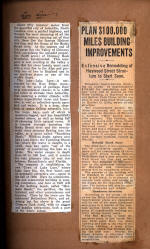
Image only.


Image only. |
| |
|
mile056 |
One photograph and one unidentified newspaper clipping.
Unidentified building; probably the Miles Building during construction.
Clipping is a photograph of the site of the Flatiron Building (center).
To the left is the Miles Building before its renovation. |
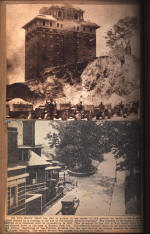
Image only.
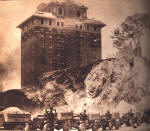
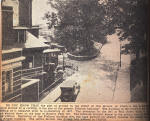
Image only. |
| |
|
mile057 |
Unidentified newspaper article, brochure, and image related to the opening
of the George Vanderbilt Hotel.
Article is dated July 24, 1924 and pays tribute to Herbert Miles's
contributions to the funding and building of the hotel.
Image at bottom of page is labeled "Lobby Floor."
Brochure features a picture of the hotel.
|
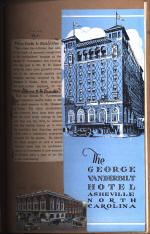
Image only.
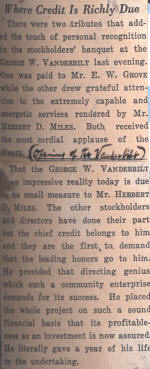
Image only.

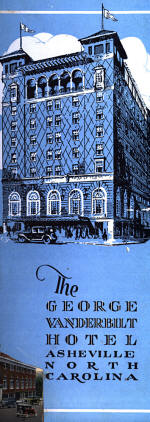 |
| |
|
mile058 |
Cover of The North American Review Journal, Vol. 214, No. 4,
October 1921. Features an article by Herbert Miles.
Cover reads:
"The North American Review
Vol. 214. October, 1921. No. 4
The Family Magazine.....Henry Seidel Canby
How Much Optimism Do We Need?.....Cornelia J. Cannon
The United States of India.....J.Z. Hodge
Problems of the Land:
Business and Agriculture.....E.T. Meredith
Rural Regeneration.....Sir Horace Plunkett
*Shall Progress Reach the Bible?.....Herbert D. Miles*
Game Laws and the Public Mind.....Louis Agassiz Fuertes
Labor Prospects in Great Britain.....G.D.H. Cole
Where Rocks Wait.....Henry Bellamann
John Synge and His Old French Farce.....Gertrude Schoepperle
Personality and Individuality.....Francis Rogers
Schools and Daughters.....Edith Hamilton
Some Impressions of My Elders --G.K. Chesterton.....St. John Ervine
The Mexican As He Is.....Carleton Beals
Culture at Dinner.....Stark Young
The Book of the Month.....La Rence Gilman |
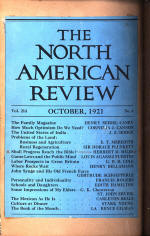 |
| |
|
mile059 |
Body of article by Herbert Miles. 9 pages. Article reads:
"SHALL PROGRESS REACH THE BIBLE?
BY HERBERT D. MILES
'A NEW Bible? Never; it can't be
done!' That, it is more than probable, will be our first reaction
to a proposal which I am bound to agree smacks of a foolhardy rushing in
where angels fear to tread. And very natural would be such a
reaction, too. In the sense of actual 'newness' it cannot be done,
and should not. But if our 'new' Bible shall contemplate an honest
separation, under suitable title, of all matter which in the present
arrangement has no bearing upon our everyday lives and problems, from
that part which does have such direct bearing; if it shall include a
wisely considered, a reverent but fearless expurgation, where a need for
expurgation cries to heaven, then it can be done. But we
must assume from the start a selfless and a noble personal attitude
toward the idea; we must not feel that any interference with the
venerable book, beyond the revisions that have been made, is a
profanation of a Holy of Holies.
In the course of my exchange of letters, in the winter
of 1920, with the late John Burroughs, we referred at one time, briefly,
to the Bible. Our letters were a discussion of the ancient and
inherently noble ideas of religion called Pantheism; which ideas were
held, and always most vigorously upheld, by Mr. Burroughs. He
commented: 'I think as highly of the Bible as you do. It is the
book of books, yet it is only a book, man-made.' Mr. Burroughs and
I are in perfect accord as to the Bible being the book of books.
And yet I cannot but feel, as I am sure he would too, that because it is
so, because its being so is bound up with all that it has meant to our
forefathers and, more important, with all that it is to mean to those
very different people, our children, we should with all due respect face
now, clear-sighted, courageous, our problem of its deficiencies, its
inconsistencies, its redundancies. It is a bold idea, without
doubt, whether new or old. 'All the attitudes and tempers that are
[Page 2]
possible have been exhibited long ago,' said William James, speaking
of religions generally. And that philosopher warned us that 'We
instinctively recoil from seeing an object to which our emotions and
affections are committed, handled by the intellect as any other object
is handled.'
A Bishop of the Episcopal church, in the course of a
sermon delivered last winter, declared that, roughly estimated, there
are in this country fifty million persons who are of church-going
families and fifty-million who are of church-abstaining families.
There was a time when such a declaration would have been taken to mean
that ours is a nation but half-Christian. But to all well-disposed
persons who subscribe to our constitution and laws we are rightly
inclined to award the term Christian, whether or not they have church
affiliation; mere church-going confers no special honor to-day in the
world's estimate; it may, and should, confer peace, although to achieve
that peace some of us must perforce indulge in mental reservations.
Yet I affirm, and earnestly, that we should all be churchmen. The
Church founded not upon superstition but upon deep and simple truth, is,
and must always be, the great stabilizer of society. It is to this
end that I plead for a 'changed' Bible.
Probably most of the adult representatives of those
without church affiliation do not feel a need of being explained.
Some of them are merely lazy; their attitude includes no objection to
the beliefs or even the ritual of any church; they would a little prefer
that their children be taken under the wing of one; they are simply
worldly in all that the word implies. Some among the more
ignorant, especially in large cities, feel that an attendance at church
would imply upon their part some profession of superiority over their
non-church-going neighbors; or they feel that no man has a right to be a
churchman unless he have a conscience free of guilt, and is willing to
be considered 'unco gude.' And there are of course the frankly
agnostic or atheistic.
But the very great majority of what we may
call the church-abstaining, out of this fifty millions, I am convinced,
hold back through a half-realized but deep-rooted idea that the Church
and the Bible ask them to believe and to subscribe to much that they
cannot believe and so cannot subscribe to; much that is outworn
[Page 3]
even in the simplest of services, owing to parts of the Bible.
They instinctively--and perhaps rightly--feel that a large portion of
regular church-goers shut their eyes to a good deal, restrain their
powers of thought in the interest of 'faith,' or make mental
reservations and let it go at that. Faith is a word,
unfortunately, that has been held over the devout like a sword; that has
been used as a reason for non-reason; yes, and for non-spirituality.
Yet faith is a good word, and there is a point where it is good common
sense.
We are come to a time when we want to ask the fifty
millions to come to church; to be churchmen and women. Have we a
right to ask them to come, and to be forced thereupon to hear
scripture-reading some of which makes them, if they are reflecting
individuals, feel like squirming in their seats; feel that they are
being asked, like children, to hear certain quaint tales quite without
relation to daily life, and sometimes worse things, useless, or even
abhorrent to their protesting souls? If this question seems a
profanation, let me hasten to add that such reading is exceptional; but
it should not be possible at all. It is a decided deterrent to the
growth of the Church, and of real Christianity.
There are many points of approach to this consideration
of that large portion of our Bible, especially of the Old Testament,
which is plainly unedifying for private reading and unsuited for reading
in church; which no wise clergyman would choose to read there. One
element is, the effect upon the clergy themselves of a close reading of
such things; that is, upon the narrower, less intelligent men, of whom,
alas! there are plenty. Another--our children; especially those of
tenderer years. Certain of the classics undesirable for them we
may keep from them, but to the 'holy book' they have free access; indeed
they are urged to read it freely. About such objectionable parts,
perhaps it is well not to take too much for granted as to a general
information upon the part of the reader. Specifically then--but in
part only--may be mentioned the offensive sex-narratives of Genesis, fit
for the ancient cattle-breeders, perhaps; the obsolete and confused
ritual regulations of Leviticus and Deuteronomy, most of which belong to
an outgrown stage of civilization--if we may call it a civilization at
all; Jonah and similar pure fiction, the real teaching
[page 4]
of which may have its lofty parts but is usually quite misunderstood;
accounts of a fierce and savage warfare; endless genealogies; quite as
useless as those others which St. Paul had in mind when in his Epistle
to Timothy he said: 'Neither give heed to fables and endless
genealogies.' There should be a decided condensation of the
Prophets and a more accurate rendering of the Psalms.
Before the Church shall drift away, supinely, from the
fifty millions, then, it is time with a view to preserving what is
really our guide to life, the best of the book, and emphasizing such
parts, for all Christians to take a hand in considering sanely this old,
time-intrusted, indubitably precious guide, our Bible. We are not
Chinese; we do not, because a thing is old, sink our reason in mere
veneration. And it is to be hoped that we can take it in hand
successfully without being open to a charge that nothing higher than
cold reason has possessed us. As a matter of truth, your sincere
and able reasoner perceives more deeply than others that there is, in
our natural emotion toward God, something transcending pure reason.
It is probably true that comparatively few men really
know how to think beyond what is called for by their daily routine.
That, nevertheless, is a poor reason for assuming that it matters not to
such men whether or not the Bible be left in a form such as its present,
which requires elaborate interpretation. Millions of simple souls
have lived and died content with it as it is, it is true; convinced that
every page is 'God's Word.' Great is their humble faith, and great
their imagination if they found the beauty of holiness in arid places!
But we are considering the good of infinitely more millions; their
defense against a more than probable growth of a blighting scepticism
[sic], as education shall be extended over the Earth, unless our Bible
shall be made more self-interpreting. Too much
clergy-interpretation is bad; as time goes on it must appear how shallow
a hold comes of a dependence upon such interpretation. It is shown
in Russia to-day. The saddest part of it all is--a part apparently
unrealized by good men who would hold to the present admittedly
unsatisfactory Bible because of timidity and of a cultured approval of
their personal interpretations--that so many of our own people are vic-
[Page 5]
[vic]tims, literally victims, of that Bible; and have ceased to pray.
And the matter of it is this: As children, innocent and trusting,
they have learned about the 'first man and first woman'--date, about
7000 years ago. They have learned of Noah and his Ark; of Lot,
Samuel, Samson, Jezebel, David, Jonah. They have learned of a
Virgin Birth and of other wondrous events. They have grown up;
they have acquired that little education which is a dangerous thing;
they may not have learned really to think, but they live in the
atmosphere of the twentieth century. They come to a time when they
cannot believe all that they have so trustingly taken in, with the seal
of the Church and the Bible upon it; from that creeps upon them a doubt
of the personal relationship to them of God Himself. And--so
blighting a thing is a betrayed trust, or what they must believe to be
such--from that day they cannot really pray, even though they go through
the form of prayer. Then follows naturally an indifference to
church; finally an abstinence from church. All of that is another
way of saying, perhaps, that most thinking men and women must perforce
become a little agnostic, probably with varying realization or
acknowledgment of it to themselves; not in the sense of rejecting
Christianity, but sufficiently to make them either uncomfortably
restless or dangerously passive. To the degree that is is
unsettling, this is bad, at least for their peace; to the degree that it
is growth in perception of truth, it cannot be bad. They were
unfortunately started, from a background of obsolescence.
Perhaps every Christian, whether of the clergy or of
the laity, must be agnostic to a certain degree. I am convinced
that such a rearrangement of our Bible as we may hope to see would allow
many an earnest man and woman, partly agnostic, looking upon the Church
as theirs, of whatever denomination they might choose; and would
likewise allow of the Church looking upon them as good material,
acceptable and helpful. Suppose a questionnaire to be put, to a
clergyman, a layman, and an agnostic, as follows:
Q. Do you know that God exists in a particular
form? A. I do not.
Q. Do you know that God appeared to Man, or
directed him?
A. I do not.
[Page 6]
Q. Do you know that God is not in a
sense Man's invention?
A. I do not.
Q. Do you know that Christ was of actual Virgin
birth?
A. I do not.
Q. Do you know that Christ ascended in His body
visibly?
A. I do not.
I am sure that each of the three suggested persons,
bearing in mind that the questions are in each case 'know,' not
'believe,' must reply as given, and to that extent be agnostic.
The questions, however, are only apparently important ones; actually
they are non-essentials, both as to our daily living and as to the
principles of Christianity. A faith or a want of faith, as to one
or all or them, makes not any difference in our lives or our usefulness.
I am attempting to show a very natural and a very common strain of
agnosticism; but I have nothing other than sorrow for the honest
agnostic who cannot find in his make-up any faith. We may have an
honest doubt as to the Virgin Birth and the Bodily Ascension. It
is more than probable that the followers who chronicled the birth went
back for those intimate assertions thirty years before their own
personal contact with, or actual knowledge of, Christ. In telling
of the last, they were Orientals, laboring under much strain after
intense and tragic excitements. Certainly it is a more natural
thing to believe in a Creator and to believe that He sent a message
through a special messenger, than to believe that He would without
necessity break His inviolable Law.
But Christ Himself told us to pray. The agnostic
must know this. He Himself gave us a prayer. And perhaps
beyond anything else that we have, that prayer comes to us direct and
unaltered, from His own lips. In its opening, Christ twice
mentions a 'Heaven' as a place distinct from Earth, and mentions God as
'our Father.' The extraordinary importance of this cannot be
exaggerated. It directly resolves our doubts as to the four
greatest things of Christian belief, Prayer, Fatherhood, Heaven,
Immortality. Without it, we can have doubts; with it, if we
believe anything at all, we have assurance. If we believe
anything, we believe that Christ, whether divine or human, was the one
Messenger to us from the Infinite; the one and only one
[Page 7]
with the voice of authority; the one and only one with a wisdom and a
life in harmony with His message. What is directly from His lips
then, is of supremest importance; what is clear, noble, untainted with a
suspicion of Oriental additions by His chroniclers. In that one,
small prayer, is mankind's pearl without price!
In spite of our voluminous Bible, what we actually have
as a basis for our moral law, applying to life to-day, is a
comparatively slim thread running through its Hebrew foundation, the Old
Testament, and the message of Christ, followed by the inspiration of
Paul. Beyond that, should not the Church of all denominations
encourage individuality as to belief in non-essentials, even to the
rearrangement of certain old creeds?
How, then, shall we go about this work? Far be it
from me more than tentatively to suggest its detail.
Ideally, there might be a high commission of ten men, of international
make-up, composed of four of the clergy and two laymen of the Protestant
churches, and four earnest and scholarly men outside the Church, to
represent the millions partly agnostic. To this number, if the
Roman Church should find itself interested, should be added two or more,
to represent it. This new Bible might have a First Part, called,
perhaps, the 'Hebrew Foundation,' to include all that is best of the Old
Testament. This could remain in the language of the revised
version. Legend, when retained, should be put as legend, cherished
for its high literacy and historical value; its 'holiness' removed.
The Second Part, practically our New Testament,
might be subdivided into three parts, comprising the chief bases of our
worship, our teaching, and our prayers. The first of these parts
would be of least value, being the accounts of the miraculous in the
life of Christ, and including the accounts of His birth, miracles, and
ascension. This implies a segregation which could in turn open the
question as to the need of the separate four Gospels as now printed.
It would probably be agreed that all demonology, and other questionable
beliefs common to the day in which the writers of Christ's life lived,
which are imposed upon the history of His perfect life and philosophy,
can be left out. This part might be called 'The Accounts of
the Miraculous.' The second
[Page 8]
could be our New Testament substantially as it is without the
controversial matter above indicated, and without repetitions in the
four Gospels should be consolidated. This would be the heart of
the Christian religion, including the words and philosophy of Christ and
the inspiring story of His ministry and His death upon the Cross;
followed by the splendid genius of Paul. This might be called 'The
Ministry of Christ.' Finally, the third part, which should be in
modern English, would be a recapitulation, clear and broad; in no sense
a creed in whole or in part, but rather a constitution for all churches
and all peoples, the Principles of Christianity. This might be
called 'Christian Principles.' It could be hoped that Christian
nations, in their dealings with each other and with barbarians, might
hold to it. It should be an excellent thing for the guidance of
the Mohammedan, Buddhist, and heathen nations, after they shall find it
in use in the highest political councils of the Christian Powers.
In any event, we owe it to ourselves not to feel that, because the
Christian world is made up of many creeds, many minds, and many tastes
and traditions, an agreement eliminating controversial matter may not be
concluded upon its Bible and Principles. That would be to deny the
courage and intelligence of man.
Let us then, with a great heart of courage, with a
great faith in the truth of the essentials, with a forward-looking
sacrifice of the non-essentials, have the good sense to venerate and
keep for our actual guidance only that which is genuinely holy in use,
rather than holy in tradition only. If we shall not, there is
trouble ahead. Too long have laymen leaned upon the responsibility
of the clergy; too long have the clergy solemnly agreed that much of the
Bible as it now is used is open to controversy or is redundant, but
that, as such parts do not interfere with 'essential truth,' they can
supinely allow it all to stand. Modesty, humility and breadth,
rather than dogmatism or dodging, are needed, even to the rearrangement
of Creeds. The world grows fast to-day, and such a course would
surely double the Church's membership throughout the world, and its
usefulness. Initiative and courage in this making of our new Bible
may not come from the clergy; many will regard it as a
profanation,--poor men!--but in the end the clergy will be the leaders.
[Page 9]
We cannot wait for the settlement of more or less friendly
differences as to points of controversy. Never, possibly, will
they be settled. Let them remain unsettled, but let the spirit
remain friendly. Two thousand years is a small portion of the time
for which Christ preached. Certainly our new Bible must be so made
as to try to end controversy, else the work shall be but half done; that
is, it must emphasize only essentials and the Church must not, as in the
past, adopt certain interpretations and heap obloquy upon the doubting
Thomas. And let us earnestly hope that the initiative, strong and
unyielding to discouragement, shall come, and soon, from laymen; not
leaving the clergy the responsibility for starting the movement for a
new Bible. It is for us, the laymen, to 'start something.'
Surely we do need a Guide in our Bible, a Guide that
shall be clear, that shall be unconfusing in a world of confusion and of
national and individual selfishness. Nations and individuals can
and have risen to a white flame of sacrifice when called upon. We
all wish to be useful and happy, and clumsily try to be. Our
guidance must be less beclouded in the future, for the good of the
world. And beyond this world too, our Bible takes us; we may
rejoice that in our Lord's Prayer we have a Heaven and a Father
confirmed to us. We cannot help a feeling that we have in our
being that super-self, whatever it may be, that is so beautifully and
mysteriously expressed in the poet's vision:
When that which drew from
out the boundless deep
Turns again home.
In good time we must turn again home; and when we turn,
that most natural and human of longings must come to us, a feeling that
there is yet another light when we have 'crost the bar.' And will not
that light be discerned more clearly, and more steadfastly burn, when we
shall have our new Bible?
HERBERT D. MILES" |
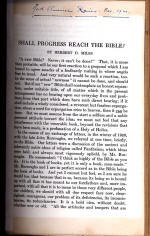
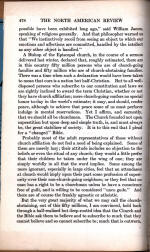
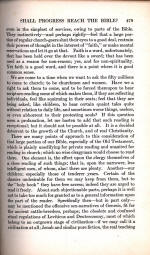
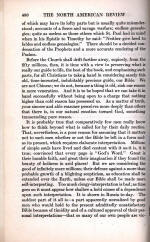
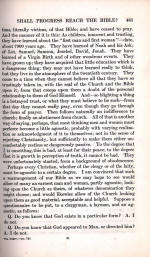
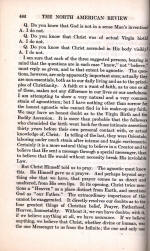
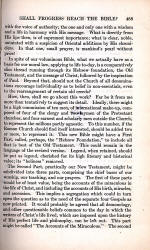
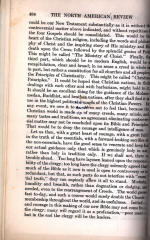
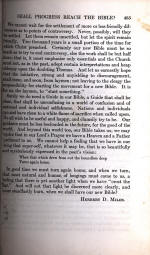 |
| |
|
mile060 |
Handwritten transcription: "Travels 1926" |
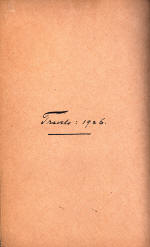 |
| |
|
mile061 |
Herbert D. Miles passport. |
 |
| |
|
mile062 |
Postcard image and handwritten inscription reading, "First Great African
Cruise. S.S. "Orca" Royal Mail. Eleanore and H. D. M. Jan 19,
1926." |
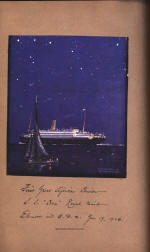
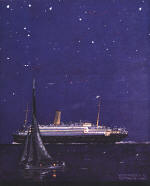 |
| |
|
mile063 |
Three photographs.
First caption: "Our first stop: Barbados[?]"
Second caption: "Cliffs - Barbado[?]s"
Third caption: "The beautiful Gloria Hotel, our home in Rio
Janiero." |
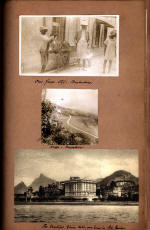

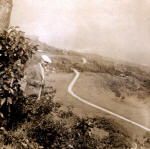
 |
| |
|
mile064 |
One photograph. Caption reads: "One of the finest photos ever taken:
Sunrise in Harbor of Montevideo, Uruguay, from the deck of the 'Orca'." |
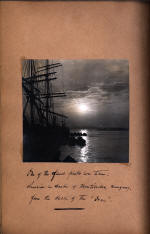
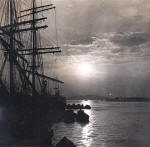 |
| |
|
mile065 |
Two photographs. Inscription reads: "One of the strangest and
loneliest spots on Earth: Island of Tristan di Cuna [Tristan da
Cunha], between So. America and Africa. This is the launching of the
Orca's raft for the lonely inhabitants, containing our presents to
them. There being no harbor, ships cannot go very near." |
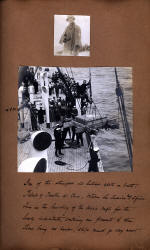
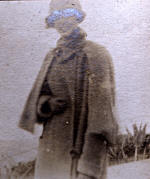
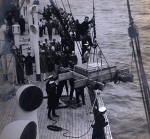 |
| |
|
mile066 |
Two photographs. First caption reads: "The strange Harbor of Rio Janiero
-very beautiful."
Second caption reads: "Father Neptune's Cross[?] : Crossing the
Equator." |
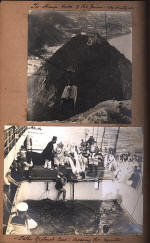
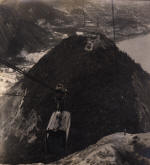
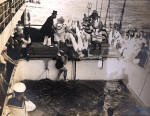 |
| |
|
mile067 |
Three photographs.
First caption reads: "Beautiful city of Capetown, So. Africa, and
Table Mountain"
Second caption reads: "Adderly Street, Capetown"
Third caption reads: "View from Gardens of Governor Teck[?],
Capetown." |
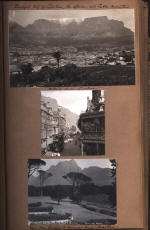

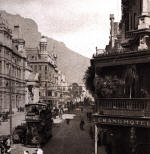
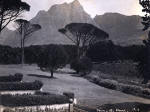 |
| |
|
mile068 |
Two photographs.
First caption reads: "Tax-drivers: Durban, So. Africa."
Second caption reads: "Native family; not far from the City." |
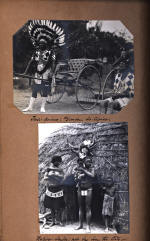
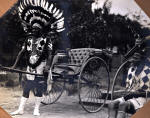
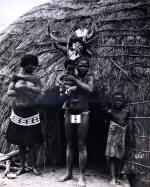 |
| |
|
mile069 |
Four photographs.
First caption reads: "Infants from Victoria Falls: brought
back in our ship; Leopards."
Second caption reads: "Snapped by H. D. M. at a Train stop -
Rhodesia."
Third caption reads: "Wall built in prehistoric times by peoples
unknown: Zimbabwe ruins, Rhodesia. Supposed to be the 'Land of
Ophir' of King Solomon."
Four caption reads: "One dancing party, given for us at
Johannesburg." |
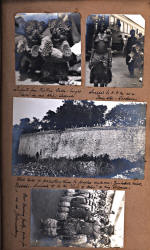
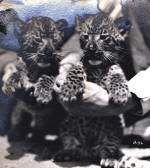
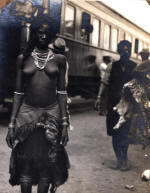

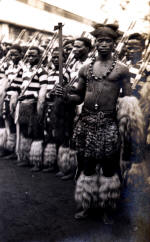 |
| |
|
mile070 |
Four photographs.
First caption reads: "Beautiful Houses of Parliament:
Capetown, So. Africa."
Second caption reads: "Street in Pretoria, Transvaal."
Third caption reads: "Scene in our Farm, near Pretoria."
Fourth caption reads: "Pretoria residence of Governor, the King's
Representative on the road of the Willows Farm and Diamond country." |
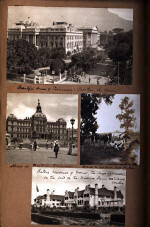

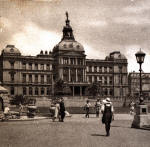
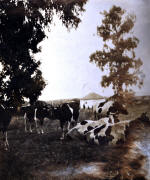
 |
| |
|
mile071 |
Two pieces of public documents relating to the Boer War and one
photograph. First document caption reads: "Public Document of
President Kriiger About the period of Boer War."
Second document signed by President Kriiger, dated October 1896.
Caption reads: "'(Don Paul[?]' the great President of the
Boer Republic"
Photograph caption reads: "Overlooking 'Don Paul's[?]' City,
Pretoria, 1926." |
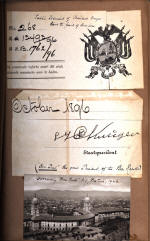


 |
|
|
|
mile072 |
One photograph and map of Victoria Falls. Photograph caption reads:
"The greatest Scene of grandeur in the world. This is but a fraction
of it." |
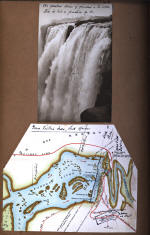
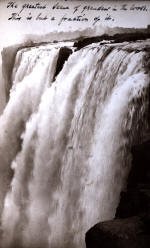
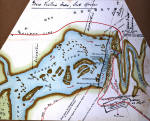 |
| |
|
mile073 |
Three postcard images.
First caption reads: "Street in Island of Zanzibar, Africa."
"Our last stop in Africa -Asyut, Egypt."
Second caption reads: "Tombs of the Kings, near Asyut. Tomb
to [?]"
Third caption reads: "Interior of Tomb: Joists[?]
unpainted[?] today." |
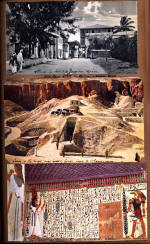


 |
| |
|
mile074 |
Handwritten inscription: "Europe" |
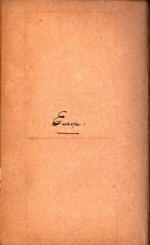 |
| |
|
mile075 |
One image. Caption reads: "Beautiful, beautiful Island of
Capri, near Naples, Italy." |
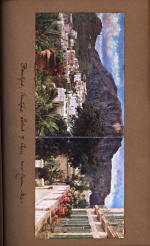
 |
| |
|
mile076 |
Captions for photographs and image on facing page.
"Paris: the City of Cities.
The plane in which I flew from Amsterdam to London via Rotterdam.
Typical street in Amsterdam: City of Canals." |
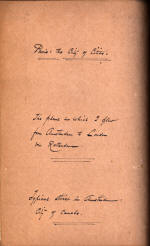 |
| |
|
mile077 |
See captions above. |
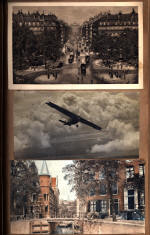


 |
| |
|
mile078 |
Captions for images on facing page.
"Typical Swis Village: Lake Lucerne.
Switzerland: a dizzy Deal!" |
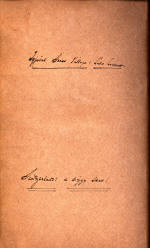 |
| |
|
mile079 |
See captions above. |
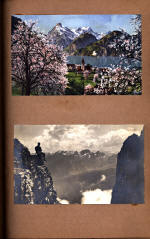

 |
| |
|
mile080 |
Captions for images on facing page.
"The Lake Country: England. Place where H. D. M. went
rowing, Lake Windermere."
"Loch Katrine, Scotland, Ellen's Isle. Where H. D. M. spent some
time, after seeing the Walker Cup International Golf Tournament, at old
St. Andrews, June 1926." |
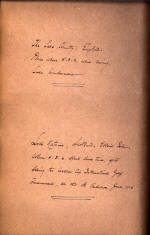 |
| |
|
mile081 |
See captions above. |
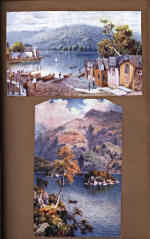

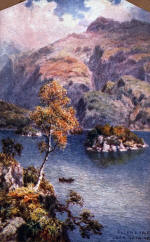 |
| |
|
mile082 |
1930 newspaper record of Herbert Miles winning an essay contest with the
article "Why Asheville Should Have Faith in Asheville."
Handwritten notes on page record a hole-in-one golf shot, and follow:
"H. D. M.'s best Golf: not much, but wonderful for him!
Biltmore Forest Club. The #16 hole, 427 yards, at Biltmore Forest.
Only "2" ever made there!" |
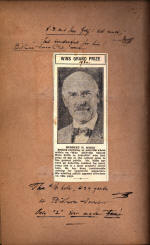
Image only. |
| |
|
mile083 |
Two golf scorecards and two photographs.
First photograph caption reads: "1927. H. D. Miles:
Chas. M. Dahurst[?]: Harvey Firestone: Chas. Locff[?]"
Second photograph caption reads: "My favorite partner.
Parey B. Eckhart. 1927" |
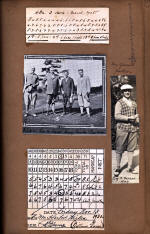

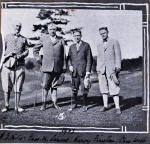

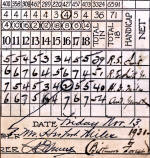 |
| |
|
mile084 |
Letter from Lee S. Overman [member of the United States Senate Committee
on Appropriations] to Herbert D. Miles. Reads:
"4 December 1930.Herbert D. Miles,
Albemarle Park,
Asheville, N.C.
My dear Mr. Miles,
In compliance with your request, I have
prepared a bill along the lines suggested authorizing the Secretary of the
Treasury to convey the old post-office site to the City of Asheville for
park and street purposes and introduced it in the Senate on yesterday.
I am enclosing, for your information, copy of the bill. I hope we
may be successful in getting it through all right.
With best wishes and compliments of the Season, I am
Very truly yours,
L S Overman
[Herbert Miles note at bottom of letter]: Senator Overman's last work!
He died, a few days after signing this letter! H. D.
M" |
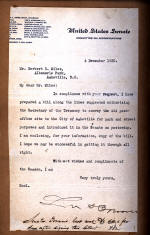 |
| |
|
mile085 |
Telegram and newspaper photograph concerning Pritchard Park.
Telegram reads: "CH67 9 GOVT=SU WASHINGTON D.C. ["Feb" inserted]
26 ["/31" inserted] 1220
HERBERT D MILES=
ASHEVILLE NCAR=
SENATE COMMITTEE UNANIMOUSLY PASSED THIS MORNING=ASHEVILLE PARK BILL
CAMERON MORRISON."
"Owing to Asheville having given to the U.S. two sites for Post
Offices, we had a unique claim for return of the first. H. D. M.
singly persuaded Senator Overman over his objections, and started the
movement. With Geo. Stephens, Gampe[?] Pritchard + Sm. Morrison.
I finished it."
Newspaper photograph depicts newly created Pritchard Park covered in
snow. |
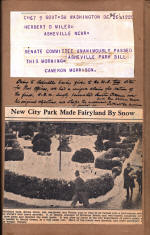
Image only.

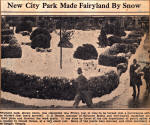
Image only. |
| |
|
mile086 |
Two unidentified newspaper articles.
First article discusses a 200-yard golf shot made by Herbert Miles at
the Biltmore Forest Country Club.
Second article concerns the reelection of officers in the North
Carolina Society of Mayflower Descendants. Raleigh, 1937. |
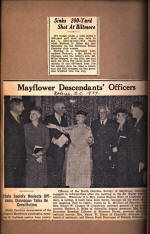
Image only.
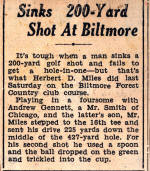
Image only.
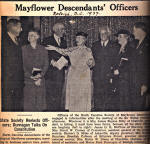
Image only. |
| |
|
mile087 |
Two images. Caption reads: "Edward Winslow House (with Cupola
above) which we bought for National Headquarters of the Society." |
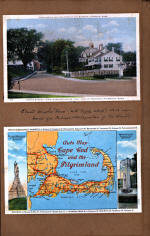

 |
| |
|
mile088 |
Letter from Charles M. Schwab to Herbert D. Miles. Reads:
"October 11th, 1934.
Dear Mr. Miles,
Thanks, very much, for your nice letter of October 6th,
with enclosed clipping.
How ridiculous for anyone to put me in such a class.
However, I find that reputations are often illfounded and have their basis
on some incidents that are of little consequence in life and yet perhaps
popular. It is hard to live up to a reputation of that sort. I
would rather have yours, which, you know in your own heart, is well
deserved.
It would be a pleasure to see you again. Times
are so" |
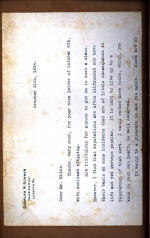
 |
| |
|
mile089 |
Letter from Charles M. Schwab continues: "bad and business demands so
great, that I have little opportunity to go anywhere.
Mrs. Schwab is holding her own. We are both very
well and getting ready to leave for the city next week, although the
weather continues fine here. I am sure it must be delightful in
Asheville.
With best regards, and all good wishes, I am
Sincerely yours,
Charles Schwab
Mr. Herbert D. Miles,
Albemarle Park,
Asheville, N.C." |
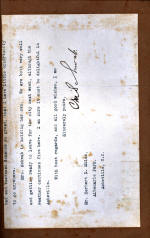
 |
| |
|
mile090 |
"A Whimsey Written When Lake Lure Was New:
(Old meter of 'London Bridge is Falling')1. Go down to Lure in
Dogwood time, in Laurel time, in Blossom time,
To bright Lake Lure at bud-time (it isn't far from Asheville;)
And you shall wander hand in hand with love, in Springtime's wonderland;
So speed to Lure and sail its shore, (it isn't far from Asheville!)
2. The dogwood trees are seas of bloom; the soft perfume makes
April June;
The laurel blossom's quite a boon (and oh, so near to Asheville!)
And there, perhaps, when night is nigh, and all the world's a blaze of
sky,
The Whip-poor-will, that bird so shy, will sing (not far from Asheville!)
3. The Mocking bird is somewhat rare, and yet I'll swear, you'll
hear him there,
At sweet Lake Lure, in laurel time, (and still so near to Asheville!)
The Carolina Wren sings too, and after dark the wierd [sic] hulloo,
The ghostly call, tu-whit, tu-whoo of Owls, to ogle Asheville!
4. In fact one scarce can find a bird that isn't heard, at dawning
heard,
At rare Lake Lure in Blossom time, (an hour's run from Asheville!)
So when the laurel starts to pout, and all the Chestnut spires are out,
You'll hear them there without a doubt, all chorusing for Asheville!
Herbert D. Miles 1927" |
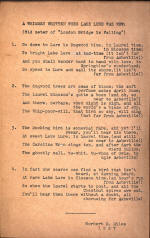 |
| |
|
mile091 |
Three unidentified clippings.
First caption: "Very early date as to Asheville
country." Article talks about Hernando De Soto's early exploration of
America, with a brief mention of his journey through Western North
Carolina.
Second caption: "a favorite poem." Poem reads:
"A Garden is a lovesome thing, God wot;
Rose plot,
Fringed pool,
Ferned grot --
The veriest school
Of peace; and yet the fool
Contends that God is not.
Not God, in Gardens when the eve is cool?
Nay, but I have a sign;
'Tis very sure God walks in mine."
Third caption reads: "A good poem about an old place."
Caption on poem reads: "Near where Grandfatehr Smith was married.
Digby, Nova Scotia." Poem reads:
"DIGBY
By Hermann Hagedorn
I spent three hours in Digby. I will remember the bay;
The white sails gliding through the gap for strange lands far away;
The heavenly waters stretching by many a purple slope;
The tide from out of Fundy, quiet of foot as hope.
I will remember Digby, where the streets are steep and
still;
And placid eyes look on the world as it passes by, up hill,
And the churches look on the sea, as all good churches should,
To keep a hint in the eyes and ears of the heart and the voice of God.
I will remember the apple tree on the hill above the town
Where a vagabond stretched his lazy limbs and wrote these verses down." |
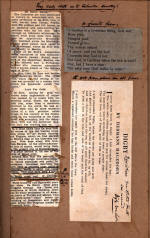
Image only.

Image only.

 |
| |
|
mile092 |
"Statement of Line of Eligibility for Membership in the Society of
Mayflower Descendants." |
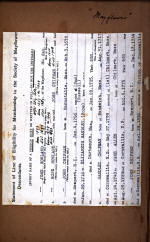
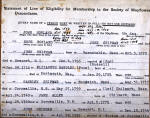 |
| |
|
mile093 |
"Statement of Line of Eligibility for Membership in the Society of
Mayflower Descendants," continued. |
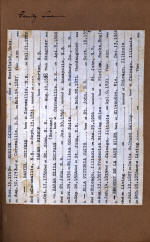
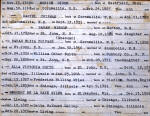 |
| |
|
mile094 |
Caption reads: "This has been considerably changed, in my 'Collected
Poems.'"
Poem reads:
"GREAT GIVINGOur risen sun, in noble ministry
Pours from its heart a never-failing power.
Now gently, gently in its valiant might
It asks the drowsy clouds of night
To stir the dawning's hour:
Its perfect art
Gives to old lands enslaved or free, new light;
For the bewildered realms that lie undone
Whose mournful peoples grieve and cower,
New hope is won.
Soft glow its all-embracing rays
Infolding an awakening world with cheer,
Returned from lending glory to the moon.
Forever a new morn, increasing to the noon
Comes to bring peace wherever peace is lost,
And scorns the cost.
The sun's proud passions, vehement and rife,
Breed ardently upon the earth beneath
All that is life;
And timelessly
From its warm spirit new-made strength is hurled
In re-creation of a darkling world.
Heirs to a fate as proud,
Enchained as fast, still groping in life's dark,
We too are charted to our feebler course,
And when the flood tide serves
We must embark.
Our fate to sow, and reck not what is sown;
To offer up life's waters, yet athirst;
To spend in work and folly, and to fight --
Breaking our heedless hearts for goals unknown;
To give, and never cease:
Great giving, is God's price
For peace!
Herbert D. Miles
1941 |
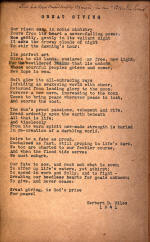 |
| |
|
mile095 |
Caption reads, "This has been improved in my 'Collected Poems.'"
Poem reads:
"BEAUTY ABIDINGSlight tawny sprays left of last year's Abelia
Unfold undying loveliness, an old allure
Where beauty dwells.
Within the shadowy abode lie timid hues
Of ivories, purples, greens,
The shy, elusive green of a past summer's light,
The faded purples of a temple rug, deep-tinted ivories,
All faintly glowing.
Gift of a prodigal heaven, their beauty ministers
To a frail host whose race is run;
Serenely their imperishable charm
Echoes creation's all-infolding love;
Changeless and ageless.
The hills upon whose sides Abelia blooms
Are dead a billion years, the sprays a year,
And each holds purest beauty:
Part of the power that wrought in ages gone
Lies in the hills;
Part of the life of last year's sunlight dwells
In the Abelia;
And these soft colors that entrance me now
Were in an Autumn sunset.
Life everlasting: to the hills, color and form and light;
To us a spirit, to be kept or lost --
And this is beauty.
Not death, not time holds power over it,
All else is cast away;
The soul endures -- if it is beautiful.
Herbert D. Miles
1939 |
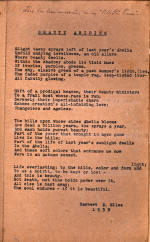 |
| |
|
mile096 |
Caption reads: "(This, written for dearest Delia's funeral service,
and sung, has been slightly changed in my 'Collected Poems')" Poem
reads:
"(NOTE: It seemed unfortunate that none of the Hymns commonly used
for burial services were written with that purpose in view. This
is a modest attempt to supply that omission.)
A HYMN
For burial song services;
To Cuthbert's tune of
'Our Blest Redeemer' in the
Episcopal Hymnal
O God, Creator, Father, Friend,
To thine eternal shore
Take this new spirit: to thine arms
Forevermore!
The earthly house is cast aside,
A soul is poised in flight;
Guide thou its quiet pathway home --
Lead, Kindly Light!
In sorrow, dust to dust we lay
A mortal frame made free;
O God our Father take this soul
In peace to thee!
Herbert D. Miles
1942 |
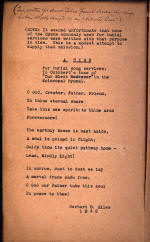 |
| |
|
mile_loose001 |
Extra copy of article on pages 50-51 above. |
 |
| |
|
mile_loose002 |
Handwritten note. Reads:
"Oliver Wendell Holmes compared a man to a living Omnibus in which he
carries all his ancestors. Most of us are copies of those who have
gone before us. We take up into our lives their traits +
characteristics + are hampered by their faults - helped by their
virtues. Our progress is accelerated or handicapped by what we
have received from[?] our ancestors.
Pu[?] magazine." |
 |
| |
|
mile_loose003 |
Handwritten note to Herbert Miles from Mrs. John R. Todd [?]
December 27, [n.d.]. 6 pages. |
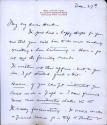
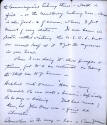
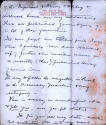
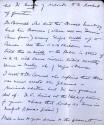
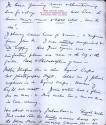
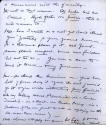 |